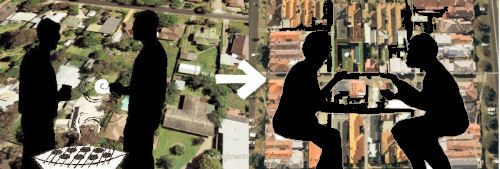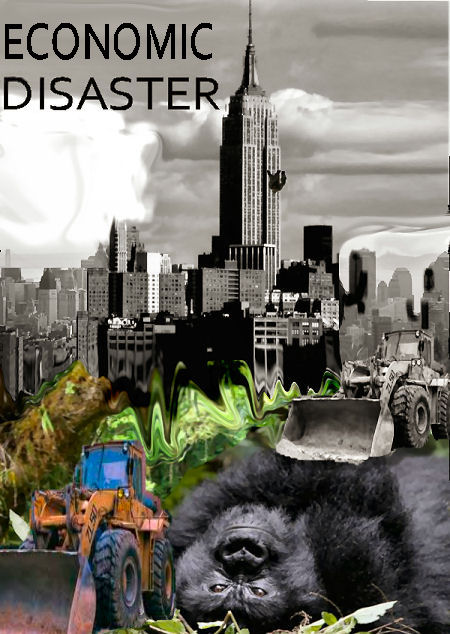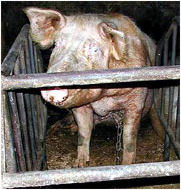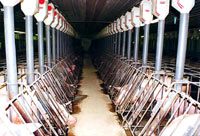capitalism
Name a successful communist country
 It is very hard to cite a 'successful' Communist economy when every single one has been attacked militarily and undermined by US-NATO forces. Nonetheless some have survived. Most have not.
It is very hard to cite a 'successful' Communist economy when every single one has been attacked militarily and undermined by US-NATO forces. Nonetheless some have survived. Most have not.
Yugoslavia was a communist country founded by communist partisans who resisted Nazi occupiers during the second world war. Yugoslavia prospered until after the Soviet bloc collapsed. As a result Yugoslavia was isolated and was pulled apart by subversion and military aggression by US-NATO.
The Democratic Peoples' Republic of Korea (DPRK - also known as 'North Korea') survived the most ferocious bombardment (per square kilometer) endured by any country in history during the 1950-1953 United States war against Korea. Given that this is even attested to by US Airforce General Curtis Le May, there can be no doubt that this was a genocidal war. In spite of that, the North Koreans and their Chinese allies were able to fight the United States and its allies to a stand-still.
In Greece during the Second World War the Greek Communist-led ELAS partisans administered most of the country that they had liberated from the Nazi occupiers and their collaborators. In spite of the war and conflict, these regions were very prosperous. Unfortunately because of the infamous 'percentages agreement' between Stalin and Churchill, in October 1944, the Greek ELAS partisans were tricked by the Greek Communist Party (KKE) into disarming, whilst former collaborators were rearmed by the British. As a consequence of this the liberated zones were conquered.
Most post-war countries could be described as socialist, or at least command economies, with all resources and services nationalised. Gradually they have been privatised, with disempowering effects using the excuse of economic liberalism. Syria is socialist and worked very well before being attacked by US-NATO. Cuba has a completely socialist economy and has faced total hostility and continous sanctions and propaganda from the United States, yet has managed to survive for 60 years, even when the oil subsidies from the soviet union were cut off it still managed to keep its economy going. They supplied doctors to work in lots of third world countries in Brazil, Venezuela, Africa. Every Cuban has free medical and hospital services.
Venezuela is yet another case where the capitalists simply won't permit any other form of economy.
India: "Capitalism - a ghost story," by Arundhati Roy
 The same forces are at work across the entire globe - whether it be Ukraine or Australia, Elites (the 1%) are seeking to make the vulnerable more vulnerable in an insatiable effort to consolidate their wealth, and perhaps more importantly for them (and us) - their power.
The same forces are at work across the entire globe - whether it be Ukraine or Australia, Elites (the 1%) are seeking to make the vulnerable more vulnerable in an insatiable effort to consolidate their wealth, and perhaps more importantly for them (and us) - their power.
It is now clear that America's democracy is completely corrupted.
It seems that Australia is also going down this path, with Joe Hockey 'selling' access for $22,000, and many other rorts for a privileged few going behind the scenes, such as those involving Sinodinos.
 According to researchers from Princeton and Northwestern universities the U.S has now
According to researchers from Princeton and Northwestern universities the U.S has now
"taken a turn down elitist lane and become a country led by a small dominant class comprised of powerful members who exert total control over the general population — an oligarchy"
So it seems that Australia is not far behind and as civil society in Australia is not-so-slowly dismantled, we will increasingly suffer the ill-effects of its absence as we change from a society that aims to look after the interests of all to one that looks after the interests of the few.
And if the 99% try and stop it, they are criminalised - with nearly 8,000 arrests of former participants in the Occupy movement globally,- or subjected to brute force, as is being discovered by the residents of the Northern Rivers Region, who are now appealing to the United Nations for protection.
And it is clear where this path leads, the U.S is now walking down it, as other countries have before. The experience of these countries, such as India, is well documented, so there really should be no surprises for Australians as to where we will end up. Australia, as an 'ally' of the U.S participates in its massive data collections through bases such as Pine Gap. The experience for other nations is that:
"The gathering of information to control people they rule is fundamental to any ruling power. As resistance to land acquisition and the new economic policies spreads across India, in the shadow of outright war in Central India, as a containment technique, the government has embarked on a massive biometrics programme, perhaps one of the most ambitious and expensive information-gathering projects in the world— the Unique Identification Number (UID). People don’t have clean drinking water, or toilets, or food, or money, but they will have election cards and UID numbers. Is it a coincidence that the UID project run by Nandan Nilekani, former CEO of Infosys, ostensibly meant to “deliver services to the poor”, will inject massive amounts of money into a slightly beleaguered IT industry? (A conservative estimate of the UID budget exceeds the Indian government’s annual public spending on education.) To “digitise” a country with such a large population of the largely illegitimate and “illegible”—people who are for the most part slum-dwellers, hawkers, adivasis without land records—will criminalise them, turning them from illegitimate to illegal. The idea is to pull off a digital version of the Enclosure of the Commons and put huge powers into the hands of an increasingly hardening police state.
Nilekani’s technocratic obsession with gathering data is consistent with Bill Gates’s obsession with digital databases, “numerical targets”, “scorecards of progress”. As though it is a lack of information that is the cause of world hunger, and not colonialism, debt and skewed profit-oriented, corporate policy."
Of course all this links back to undermining and decay of our system of government to the point where it fails:
"Corporate-endowed foundations are the biggest funders of the social sciences and the arts, endowing courses and student scholarships in “development studies”, “community studies”, “cultural studies”, “behavioural sciences” and “human rights”. As US universities opened their doors to international students, hundreds of thousands of students, children of the Third World elite, poured in. Those who could not afford the fees were given scholarships. Today in countries like India and Pakistan there is scarcely a family among the upper middle classes that does not have a child that has studied in the US. From their ranks have come good scholars and academics, but also the prime ministers, finance ministers, economists, corporate lawyers, bankers and bureaucrats who helped to open up the economies of their countries to global corporations."
and the final conclusion:
"Capitalism is in crisis. The international financial meltdown is closing in. The two old tricks that dug it out of past crises—War and Shopping—simply will not work.
The proletariat, as Marx saw it, has been under continuous assault. Factories have shut down, jobs have disappeared, trade unions have been disbanded. The proletariat has, over the years, been pitted against each other in every possible way. In India, it has been Hindu against Muslim, Hindu against Christian, Dalit against Adivasi, caste against caste, region against region. And yet, all over the world, it is fighting back. In China, there are countless strikes and uprisings. In India, the poorest people in the world have fought back to stop some of the richest corporations in their tracks.
Capitalism is in crisis. Trickledown failed. Now Gush-Up is in trouble too. The international financial meltdown is closing in. India’s growth rate has plummeted to 6.9 per cent. Foreign investment is pulling out. Major international corporations are sitting on huge piles of money, not sure where to invest it, not sure how the financial crisis will play out. This is a major, structural crack in the juggernaut of global capital.
Capitalism’s real “grave-diggers” may end up being its own delusional Cardinals, who have turned ideology into faith. Despite their strategic brilliance, they seem to have trouble grasping a simple fact: Capitalism is destroying the planet. The two old tricks that dug it out of past crises—War and Shopping—simply will not work."
Thus these excerpts from Arundhati Roy's article at Outlook India.com above indicate that India, like Greece and Ukraine, is another example of the excesses of corporate shock doctrine, which is in the process of being applied to Australia.
Aussi version of Creation - what happened to the blokes eventually

 This story follows on from "The Aussie version of creation" an illustrated story which is circulating widely by email, author unknown. [If you are the author, please let candobetter.net know and they will acknowledge your work.] I copy it here to give the context in which the story of blokes arose, but I have updated the story with changes to conditions in Aussi Paradise.
This story follows on from "The Aussie version of creation" an illustrated story which is circulating widely by email, author unknown. [If you are the author, please let candobetter.net know and they will acknowledge your work.] I copy it here to give the context in which the story of blokes arose, but I have updated the story with changes to conditions in Aussi Paradise.

The Aussie verson of creation.
In the beginning God created day and night.
He created day for footy matches,
going to the beach.....
And BBQ's.......
He created night for going prawning,  sleeping
sleeping
and BBQ's, 
On the Second Day, God created water....
for surfing, swimming
swimming 
and BBQ's on the beach,
On the Third Day God created the Earth to bring forth plants  to provide malt and yeast for beer
to provide malt and yeast for beer 
and wood for BBQs,
On the Fourth Day God created animals
and crustaceans  for chops, sausages,
for chops, sausages,
steak and prawns for BBQ's 
On the Fifth day God created a Bloke  to go to the footy, enjoy the beach, drink the beer and eat the meat and prawns at BBQ's, and God saw that it was good.
to go to the footy, enjoy the beach, drink the beer and eat the meat and prawns at BBQ's, and God saw that it was good.
On the Sixth Day God saw that the Bloke was lonely and needed someone to go to the footy, surf, drink beer,  eat and stand around the barbie with.
eat and stand around the barbie with.
So God created Mates,  and God saw that they were good Blokes.
and God saw that they were good Blokes.
On the Seventh Day God looked around at the twinkling barbie fires,  heard the hiss of opening beer cans and the raucous laughter of all the Blokes. He smelled the aroma of grilled chops and sizzling prawns and
heard the hiss of opening beer cans and the raucous laughter of all the Blokes. He smelled the aroma of grilled chops and sizzling prawns and
God Saw that it was good .. ...
Well..... Almost good.....
He saw that the Blokes were too tired to clean up and needed a rest.
So God created Sheilas  to clean the house, to bear children, to wash, to cook and to clean the Barbie, and then God saw that it was not just good....
to clean the house, to bear children, to wash, to cook and to clean the Barbie, and then God saw that it was not just good....
It was Bloody Awesome!
IT WAS AUSTRALIA !!!!! 
The Story of blokes, continued - by Quark

And that was pretty good for a while for most blokes and the sheilas didn’t mind it much either. They used to quite like BBQs in the back yard as it saved on washing up and the blokes did most of the work anyway. But as time went on, the back yards disappeared and so, fewer blokes could have BBQs with their mates and sheilas.
The blokes who couldn’t have bar-b q-s became quite aggro as they felt cooped up  which is natural as they had been created as BBQ loving creatures.
which is natural as they had been created as BBQ loving creatures.
The other thing that changed was that the sheilas could no longer spend all their time looking after children, cooking, cleaning "barbies" etc. as they had to go to work to help pay off the mortgage on the apartments sans backyards. 
This, they were told by the newspapers,  was the way it was going to be for all blokes eventually in Australi-bloody –a and that they could no longer expect to have back yards with "barbies".
was the way it was going to be for all blokes eventually in Australi-bloody –a and that they could no longer expect to have back yards with "barbies".
This cut to the quick of blokes lives and affected their mental and physical health. Whilst blokes always had beer guts, they were starting to have more than that and to be actually obese  from all the fast food they had to eat on account of the sheilas no longer having time to cook.
from all the fast food they had to eat on account of the sheilas no longer having time to cook.
The other problem for blokes was that whilst they used to love going to the footy, they also liked to kick a footy around with their mates. This became harder as the local footy grounds and playing fields disappeared under masses of town houses.  The blokes became quite sad but they did not know quite what they were sad about as they still had their beer even though the barbies had gone.
The blokes became quite sad but they did not know quite what they were sad about as they still had their beer even though the barbies had gone.
The blokes had really enjoyed surfing, swimming and fishing as the sea and rivers had been created for this purpose. But around the same time as the back yards disappeared the blokes started to have trouble parking their utes at the beach.
A whole lot of signs started appearing at their favourite places saying they only had two hours for a day of surfing and swimming and, what’s more, they had to pay for the privilege! 
This made the blokes furious because they used to be free to do what they bloody well liked in Australi-bloody –a.
Then these blokes got older and got a bit used to not getting their own way. They started reminiscing with their mates instead of trying to do all these blokey things. A new lot of blokes cropped up who never knew that you could have a day at the beach and not have to worry about parking.
These blokes were different and seemed happy to sit in cafés with drinks that you would expect sheilas to like such as cappa –bloody chinos and café –bloody- lattes whilst playing with their mobile bloody phones  which were not created by God, unlike the sea and the plants for the malt and the yeast for the beer and the sheilas and the crustaceans.
which were not created by God, unlike the sea and the plants for the malt and the yeast for the beer and the sheilas and the crustaceans.
And the other bloody fly in the ointment for the blokes was that, whilst they used to have plenty of time for surfing and swimming and fishing after work and on their “sickies”, most of these blokes, one by one, lost their bloody public service jobs or permanent sort of cushy jobs even in the private sector and had to go onto contracts.  This bloody meant that they were even working when they weren’t being paid in the time that they would have been surfing and swimming! What’s more they didn’t get “sickies” or if they did they didn’t have time to take them or they’d lose their jobs!
This bloody meant that they were even working when they weren’t being paid in the time that they would have been surfing and swimming! What’s more they didn’t get “sickies” or if they did they didn’t have time to take them or they’d lose their jobs!
The blokes who virtually had owned the bloody place no longer seemed to! It was as though the place that had belonged to all blokes to enjoy and do as they bloody well pleased now belonged to a few blokes that they didn’t even know and who seemed to live in castles somewhere and even had houses overseas or owned whole islands.  They were not regular blokes. The regular blokes sort of lost their "blokiness" when they were put in this position. They started to agree with the blokes they didn’t know who now seemed to own the bloody place. Maybe the blokes thought this was the way for them to own the place again…
They were not regular blokes. The regular blokes sort of lost their "blokiness" when they were put in this position. They started to agree with the blokes they didn’t know who now seemed to own the bloody place. Maybe the blokes thought this was the way for them to own the place again…
Meanwhile what was happening to the sheilas? Well the sheilas never thought they owned the place unless they were rich sheilas, but that didn’t matter because the sheilas could go where they pleased and it was as good as owning the joint. So when the backyards disappeared around the same time as the parking signs went up at the beach and the blokes lost their cushy jobs with ‘sickies”, the sheilas who had got equal pay to the blokes a few decades earlier also lost their cushy jobs with “sickies” and found themselves on contracts.
Just as the blokes were stuck at work when they could have gone swimming, so were the sheilas. The sheilas still had to have the babies but other sheilas were hired to look after lots of babies while the sheilas who had the babies went to work to pay the mortgage for the apartment or the house with not even enough land for a BBQ.
The blokes and the sheilas had to race to the child care centre before and after work to drop off and pick up the babies. Life for both blokes and sheilas became a balancing act to maintain a life without BBQs, surfing and swimming.
But most blokes and sheilas were very appreciative of the large flat screen teles that were the centerpieces of all living rooms in Australi-bloody- a.

It had all happened so insidiously, the blokes didn’t realise. And that’s the story of blokes.
Savage face of capitalism: Film -Texas drought conflict between citizens and fracking miners on water use
 France has banned fracking, but the United States is allowing lateral mining to utterly demolish democracy and people are facing destitution and starvation because of the lack of citizen rights in the United States to protect farm and town water. Here are some quotes from the film: "Using our resources against us"... "Greed and money: they're just sucking all of the water out of the ground. Why can't I have a say? Why can't these oil companies understand?"..."We've got to have some restrictions on mining... "If we run out of water, we're going to have to pump it in and it will cost more than oil. So why do you think the people of this town should be quiet about it?" In the face of a winner takes all, some farmers are caving in and trading farming in for mining and selling off their water. "... If you've got to have the oil you have to use the water. The demand is out there." Australia's government is going the same way as the United States.
France has banned fracking, but the United States is allowing lateral mining to utterly demolish democracy and people are facing destitution and starvation because of the lack of citizen rights in the United States to protect farm and town water. Here are some quotes from the film: "Using our resources against us"... "Greed and money: they're just sucking all of the water out of the ground. Why can't I have a say? Why can't these oil companies understand?"..."We've got to have some restrictions on mining... "If we run out of water, we're going to have to pump it in and it will cost more than oil. So why do you think the people of this town should be quiet about it?" In the face of a winner takes all, some farmers are caving in and trading farming in for mining and selling off their water. "... If you've got to have the oil you have to use the water. The demand is out there." Australia's government is going the same way as the United States.
A Symbiosis Of Corruption And Ecological Destruction: Deforestation in Sarawak And Empire-Building In Ontario
 Too often we fail to see the connection between the ecological destruction and cultural genocide of so-called "developing" nations and the lax immigration policies of those nations like Canada which play host to both the victims and the perpetrators of the tragedy. A look at the relationship between Sarawak's plight and the inflation of real estate values in Ontario, Canada and elsewhere should give us a better understanding of how plunder abroad promotes in-migration here. Canada, by offering an outlet to dirty money and the people who profit from it, must be seen as a willing accomplice and silent partner to a vast money-laundering operation.
Too often we fail to see the connection between the ecological destruction and cultural genocide of so-called "developing" nations and the lax immigration policies of those nations like Canada which play host to both the victims and the perpetrators of the tragedy. A look at the relationship between Sarawak's plight and the inflation of real estate values in Ontario, Canada and elsewhere should give us a better understanding of how plunder abroad promotes in-migration here. Canada, by offering an outlet to dirty money and the people who profit from it, must be seen as a willing accomplice and silent partner to a vast money-laundering operation.

Introducing The Godfather of Sarawak
I had a friend, "David", over for 3 hours this past Wednesday night. David, a serious Christian, and an individual of outstanding character, was a CUSO worker in Sarawak four decades ago and returned for a three month visit this winter to re-connect with old friends. Upon his return he treated me to a travelogue more enlightening and thorough than anything you would find on National Geographic program. Among his major concerns was the alarming growth of the Islamic population which is being favored by the patronage of the province's corrupt Minister, and the ominous potential that demographic shift might have for the liberty and security of non-Muslims. Coincidentally, two weeks after listening to David's account and seeing hundreds of his beautifully graphic pictures, I came upon a television documentary about the politics of this region, and invited David to view the recording. It was the 20 minute documentary that Global TV did on the Chief Minister of Sarawak, Abdul Taib Mahmood, and his kleptocracy. David confirmed the truth of most of what was said in the documentary, and was very pleased that two environmental activists in London, England were following the labyrinthine money trail from "Daddy" to his daughter Jamilah Taib Murray, the wife of Canadian Sean Patrick Murray.
The Criminal Rape Of Sarawak’s Rainforest
I was able, in the second viewing, to record several fascinating facts about Jamilah and Sean Murray's real estate investments in Canada, which ironically began in Ottawa. What I found ironic is that Ontario's 'green' Premier Dalton McGuinty, darling of David Suzuki, leads a government with 11 Ministries who pay $4.9 million a year in rent to the Murrays for office space in their building(s). The Murrays---through their "Sakto Corporation"---- own six major commercial properties in Ontario worth over $100 million , money which has its origin in the criminal rape of Sarawak's rain forest and its conversion to palm oil plantations. This is a catastrophe of global significance. One square mile of Sarawak's rainforest contains more biodiversity than all of North America. More than that, in clearing cutting an area the size of England, the logging companies---owned by Taib's family and their political allies (largely ethnic Chinese)----they have obliterated the culture of the Penan people, one of the last nomadic tribes in the world. Many Penan protesters have been overtly killed or have simply disappeared. One of them, now a Canadian resident, spent a month in solitary confinement just for participating in a blockade to stop logging trucks. He walks the streets of a Canadian suburb like a disembodied and broken spirit, stalked by memories of a life spent in a tropical heaven, a heaven that is now rapidly being transformed into hell. As he spoke to the camera, his face was concealed in darkness---a testimony to the ability of Sarawak's "mob boss" to intimidate even the people who, one would think, should be beyond his grasp.
Corruption in Sarawak Finances Real Estate Development Abroad
As the logging has proceeded, the Taib family has grow richer and richer. At least 84% of the shares of Cahya Mata Sarawak (CMS) , a Sarawak-based construction conglomerate with net assets of $760 million (US) are held by Taib’s late wife and his four children Mahmuc Abu Bekir Taib, Sulaiman Rahman Taib, Hanifah Taib and Jamilah. According to Malaysia’s Anti-Corruption Commission, CMS ,“has a track record of receiving untendered public contracts worth millions of dollars and holds a cement monopoly in Malaysia’s largest state...and has also massively benefited from the Bakun dam construction which has been labelled by Transparency International as a ‘monument of corruption’”. A CMS subsidiary “Similajau Industries” has also formed a connection with Rio Tinto Alcan to oversee the an aluminum smelter with the scope to produce up to 1.5 million tons per year.
When Jamilah was a foreign student in Canada in 1983, Daddy the Godfather and Piggy Bank, gave her $23 million to play with, and so began her real estate acquisitions in Ottawa, now extended to America, Britain and elsewhere. In fact the British government is currently looking into alleged Taib family money-laundering in the UK and British offshore financial centres. Through “Ridgeford Properties”, Sean and Jamilah Taib Murray hold luxury properties in Central London estimated to be worth several hundred million pounds. Jamilah is also currently a Director on the boards of some 63 Malaysian companies.
Canada The Land Of Opportunity And The Champion Of Diversity
It warms the heart—doesn’t it---to know that it was Canada, the land of opportunity, which allowed this enterprising immigrant to launch a business empire stretching almost across the globe, fuelled by monies obtained by crony capitalism and the wanton destruction in a faraway tropical land, home to so much biological and human diversity. How ironic that diversity can be destroyed in Sarawak to feed real estate development in a country that brags about its “diversity”.
Dalton McGuinty too can take pride in helping her to grow her business and reward Minister Taib for his program of relentless rainforest destruction. Whatever initiatives McGuinty has taken to reduce carbon emissions in Ontario have been more than offset by the deforestation that has enabled Jamilah to build her empire. With the destruction of this magnificent jungle, the world is not only losing a unique culture, and untold species---including the orangutan---but a carbon sink of similar scope to the Amazonian forest. And Canada, it seems, must make itself a haven for refugees fleeing from these kinds of tragedies, but for the perpetrators and their ill-gotten gains as well. Is this an effective remedy for a problem that is all too common in the "developing" world? In many ways, Sarawak is a microcosm of the world. Greed, corruption, economic disparity, religious friction, environmental degradation and the displacement of indigenous peoples---it is all in play. Perhaps we can attack the problem in another way. A way that would assist both Canada and those who we would want to protect from persecution. Rather than open the door to untold millions of refugees, maybe we should slam the door to the forces of greed, corruption, and destruction that drive them out. Could we not embargo their exports, most especially their exports of corrupt politicians, their family and their fortunes?
Always Follow The Money Trail
Clare Brown --the London-based environmentalist determined to expose Taib's corruption---has been able to shine a light on Taib's activities by pouring through the paper trail of investments. This, I think, is the key to discrediting any group. Thanks to Vivian Krause and Sun Media TV's persistence in showing the fraudulent nature of the David Suzuki Foundation's "charitable" status, Suzuki has been forced to distance himself from his own foundation. And the public is finally waking up to the corporate corruption of environmental groups. The Conservatives--to their credit--- seem determined to prevent green NGOs from taking donations from foreign-owned corporations. Our project, however, is to make the point that environmental NGOs should not be able to take money from ANY corporation, foreign or domestic. Shining a light on the big three (the DSF, the Sierra Club and Nature Conservancy ) and their practice of taking corporate money should be key to our effort to question their failure to address the profoundly negative impact of mass immigration---and their integrity. How does this smell: the Sierra Club of Western Canada has accepted money from the Rockefeller Brothers Fund (RFB) to protest the oil sands development and Enbridge pipelines. How interesting. Jay Rockefeller, a major donor to the RFB, is the long-time Governor and now senior Senator of West Virginia, one of the biggest coal-producing states in America, supplying coal for electricity generation to two dozen other states. According to Andrew Weaver of the University of Victoria, the burning of coal is 40 times more impactful than the burning of oil in terms of green house gas emissions, not to mention its medical effects. It seems that environmental groups are willing pawns of a corporate game that is less motivated by genuine concerns about the environment than deflecting attention from the damage they are doing in their own backyard. Shades of the East India Company, which supported Wilberforce's campaign to end slavery in order to undercut their chief rival in tea production---the West Indian slave plantations.
Scratch a noble cause and you find a mercenary motive.....
Green Inc. And “Green” Corporations---A Partnership Made In Hell
It is high time that the public come to understand that Green Inc. and the corporations that fund them are first and foremost a business. In return for the funding that maintains their paid bureaucracy and sustains their relentless quest for more and more donations, environmental NGOs give corporations what they crave---ecological dispensation, the seal of approval that they can wave on their websites and brochures as proof of their corporate "responsibility". Meanwhile, they can lobby for higher immigration quotas and aggressive outreach initiatives to recruit the foreign labour they want to fuel their drive to drill, mine and develop at an ever quickening pace----secure in the knowledge that they have bought the silence of their 'kept women' in the DSF and the Sierra Club and Nature Conservancy.
The Moral Stench Of Canada’s Growth Lobby
Canada is the Chicago of the 1920s writ large. It's bipartisan immigration policy is like a numbers racket where everyone from the cop on the beat to the politicians at City Hall get a "piece of the action". Environmental NGOs must be regarded as key constituents of the Growth Lobby, every bit as important to the team as are the slimy immigration lawyers, the cheap labour employers, the big banks, the Puppet Intelligentsia in academia and the CBC, which like the ethno-cultural organizations, feed off the taxpayer tit while they tirelessly work to undermine our country. Together they form a stew of putrid slime that has no equivalent except what one would see while peering through the hole of a outhouse. Next time you're in a Provincial Park and nature calls, take a whiff. That, my friend, is the foul stench of Canada's Immigration Industry---an industry that is fully complicit in the rape of Sarawak and regions like it across the world.
Tim Murray
May 4, 2012
Why this anti - Euro hype in the global economic crisis?
 Amid a European and global economic crisis, governments are still letting markets get away with little regulation, big bonuses and dubious financial instruments that are distorting financial stability for short-term gain and putting enormous pressure on people to pick up the manufactured debts
Amid a European and global economic crisis, governments are still letting markets get away with little regulation, big bonuses and dubious financial instruments that are distorting financial stability for short-term gain and putting enormous pressure on people to pick up the manufactured debts

Much of Britain’s press is relentlessly euro-sceptic, to the extent that the euro’s survival is being talked down and political supporters of Europe no longer speak up. For a change, think of some of the benefits.
Once again financial markets which were prime movers in causing the economic crash in 2008 are gambling on destabilising currencies. Back in the 1990s the pound bounced around wildly in the hands of speculators and it is again weak against the euro, despite the euro’s problems. The euro brought new stability to currency markets, challenging the supremacy of a US dollar, exposed by America’s massive budget deficit.
Several countries, like Montenegro in former Yugoslavia, have the euro as the official currency without being a formal member of the euro zone, because their own economies are not viable enough. Ecuador's economy hit the rocks and the country now uses the US dollar as its national currency to inject more stability.
Currency devaluation is a mixed benefit for getting out of trouble. It doesn’t tackle underlying structural problems. Nor does it help businesses in a balanced way. The last time the UK devalued its currency, economists realised that while exports may be helped, major importing economies like the UK see price inflation linked to currency devaluation in important sectors like cars, food, energy and raw materials.
As UK North Sea oil and gas reserves decline the country will be reliant on more expensive imports paid in dollars. A study for the Government’s Department of Business Enterprise: UK Continental Shelf Oil and Gas Production and the UK Economy, predicts that in a few years the UK could run up a cumulative deficit in oil and gas imports of over $500 billion – to add to our economic troubles.
Governments are still letting the markets get away with little regulation, big bonuses and dubious financial instruments that are distorting financial stability for short-term gain and putting enormous pressure on people to pick up the manufactured debts.
Financiers are now leveraging unsustainable interest rates on loans to Greece and Italy at levels similar to states on permanent aid like Pakistan and Egypt, forcing Italy to pay a 20 per cent addition to its debt in interest. Imagine a house-buyer saying they were in difficulty and being told: “Okay, we’ll triple your interest rate on the loan.” Something is wrong. The tail is wagging the dog and politicians need to get a grip.
Members of the European Union enjoy the historic integration of a continent so recently divided by wars. People can live and work across the Union with reciprocal health benefits. Yes, there are things about Europe we can improve, but countries don’t lose their identity by being better connected. They are enriched and learn from each other.
Brian McGavin Nov 2011
The Real Source of the British Riots - video
 Interesting perspective on the riots in Britain. Well commentated, with lots of useful statistics that reflect the British bias to produce a landless proletariat that gets discarded when it cannot be absorbed by industry. Says how the tax system encourages people to have children, but with fathers and mothers living separately. Final parts notes how civil war in the Middle East has coincided with very high food prices and how in Britain food prices have risen to three times the level in other parts of the EU. The video identifies itself as a "True News" service.
Interesting perspective on the riots in Britain. Well commentated, with lots of useful statistics that reflect the British bias to produce a landless proletariat that gets discarded when it cannot be absorbed by industry. Says how the tax system encourages people to have children, but with fathers and mothers living separately. Final parts notes how civil war in the Middle East has coincided with very high food prices and how in Britain food prices have risen to three times the level in other parts of the EU. The video identifies itself as a "True News" service.
SUVs Built For People Whose Delusions Are Without Limits

The only thing we have to fear is fear itself
Have you seen the latest TV commercials promoting the new Jeep Grand Cherokee for 2011? The theme is summarized with the slogan, "The Things We Make, Make Us". The 'manifesto' video ad, 1:01 minutes long, makes an unanabashed appeal to American pride and patriotism. Poignant scenes are punctuated by proud declarations.
"This once was a country that made things, beautiful things, and so it is again." "It was a country of colts (with the image of colts galloping across the screen) that made Colt revolvers, and Jeeps (pictures of a stream of Army Jeeps presumably poised for the Normandy invasion, then liberating the streets of European towns in the Second World War).... These things make us who we are."
The American industrial heartland will surely rise again, given the inspirational lead that Chrysler beckons us to follow. The fact that the non-renewable resources critical to this heroic enterprise will not be affordably available to sustain it is just one of life's tiny, inconvenient details that are best swept under the carpet. Pessimism, not the reality of limited resources, is our real enemy you know. What did Obama say? He repeated FDR. "The only fear we have is fear itself." God, is that all. And here I thought I had to worry about Peak Everything and the prospect of a thermo-nuclear exchange that might follow the desperate scramble for scarce resources. Or the strong possibility of biological and chemical war, but then, here I go being pessimistic again. Maybe I should look on the bright side of life, the life that these SUV ads promise me.
The reality of urban gridlock vs. the fantasy of wilderness escape
It is interesting that the product Chrysler is pitching an SUV whose production involved the expenditure of a least 400 barrels of oil per vehicle--or its equivalent--and tons of metals and minerals first mined, then transported, then smelted, then shipped to a factory to rendevous with rubber harvested thousands of miles away and fashioned into a vehicle by hundreds of employees who demand a range of products and services as recompense for their beautiful craftsmnship. Employees who fought two hours of traffic driving their Jeep to work, only to repeat the ordeal after their shift. But hey, they are Americans, like the can-do Americans we once knew, who get the job done! And once it is done, this same vehicle then is marketed as an off-road machine that is seen dashing through lush forests, across unpolluted rivers and over the vast and seemingly pristine Moab desert of Utah."Go where regrets can't follow" is the motto that subtitles the scene. Cameras don't show the getting there, however. You know, the Jeep Grand Cherokee stuck in bumper-to-bumper freeway traffic on a Friday afternoon as its driver tries to make it to his weekend gettaway, cursing and honking in a vehicle built for speed but trapped in a nation of gridlock. But alas, the promised land of galloping colts, lush forests and pristine deserts, the America of our fantasies, the one advertisers play on, surely awaits us. It is quite the juxtaposition. The nasty, noisy and smoky process of primary and secondary industrial activity that heralds the resurgence of proud American manufacturing, co-existing with an apparently vast and uncluttered American hinterland.
There are more than 254 million registered passenger vehicles in America and more than 100 million are SUVs and trucks, with over 8 million of that category sold in 2008 alone. Few of them apparently know or care to know that it takes 98 tons of dead plants and animals buried for eons at seabed, lake and river bottoms to produce one gallon of gas for a nation that consumes one quarter of the world's crude oil. America isn't a country of colts but a country of dolts. How sad it is to see so many fat-ass Crocodile Dundee wanabees and redneck "chicks with dicks" lay down $40,000 US to feed a self-image manufactured by Madison Avenue when their SUV spends most of its life outside a shopping mall or in the drive-in queue of MacDonalds? How many ever see the wilderness? And of those who do, how, one wonders, do they all manage to find it---where are these huge pristine expanses in a nation bursting with 308 going on 508 million people? The answer can be found in the last line of the commercial that has dominated the airways recently:
"The Jeep Grand Cherokee---built for a world without limits"
That just about says it all. American car manufacturers and their ad agencies--- and those who fall for their pitch---really don't have a goddam clue. The phrase "Peak Oil" is notably absent from all of videos and from all the reviews. Instead, we read about "fuel economy". We are supposed to be impressed that the new Jeep Grand Cherokee can allegedly travel 500 miles on a full 24.6 gallon tank. "That's 16 miles in the city and 22 miles on the highway!". Wow. That means that when gas is $20/gallon as analysts like Christopher Steiner predict it will be, it will cost you about a dollar per mile---that is if hyperinflation doesn't overtake us. Auto journalists, like the consuming public who read their columns, are like deer transfixed by the headlights. They see all the bells and whistles and all of the specs but are blinded by the same infatuation with these toys that Americans of three generations ago had for the Model T Ford. The internal combustion engine is as inefficient as it ever was. But maybe that's a good thing, otherwise there would be more drivers driving more cars. You have to feel sorry for American capitalism, it just can't defeat those efficiency paradoxes. Especially when it encourages runaway populaton growth to grow the pool of cheap labour and delusional, manipulated consumers.
I must agree. The Jeep Grand Cherokee for 2011 really is built for a world without limits. Unfortunately, that world is not the one we live in.
Tim Murray
October 15/2010
Growth Begins at Home

Short interview with anti-growth advocates highlights Canadian apathy
“Populations, like potholes, are produced locally....” Garrett Hardin
You may have heard of "S.O.S." (Save our Suburbs), an anti-growth organization that has set up shop in Sydney, Melbourne, Brisbane and Adelaide, Australia. You may even of heard of how Noosa Shire, Queensland had developed a vision of sustainability that involved capping their population level. But what about North America?
This is a 13 minute radio interview from Charlottesville, Virginia with Jack Marshall of ASAP (Advocates for a Sustainable Abermarle Population) and Brian Czech of CASSE (Centre for the Advancement of a Steady State Economy). "Jack Marshall and Brian Czech discuss limits to growth" . Canadians like to think of themselves as more "progressive" and "enlightened" than Americans. Yet where are conversations like this taking place in Canada? There are or were groups like ASAP in Vermont, Minnesota, Colorado, Oregon, California and Hawaii. Other than Qualicum Beach, BC and Okotoks, Alberta, or briefly, "Save Our Valley" in Chilliwack, BC, where is there a critical mass of citizens who have formed a strong anti-growth lobby in this country? This despite Canada having the highest population growth rate in the G8 group, with our major urban centres sprawling into greenbelts even while they densify, putting more than 500 species at risk and paving over one-fifth of our prime farmland. It is not a question of building "up" or building "out". We are just "building". Why aren't Canadians up in arms? We are pathetic and apathetic. And those of us who are not are muzzled, blacklisted and shunned by the media, staffed as it is by journalists schooled in political correctness and editors mindful of where advertising revenue comes from. There ain’t much money in giving a podium to growth-bashers.
To use Brian Czech's metaphor, we are building our house higher and higher by robbing its foundation of building materials. The foundation being finite natural capital. Yet every hick town and every major city, from Campbell River, BC to Vancouver to Saskatoon to Sudbury, Ontario and beyond is chalk full of mayors and councillors, elected by developer campaign funds, calling for more growth. Of course, it must come in the fashionable clothing of the time, that is, it must be "sustainable" or "green", complete with the necessary seal of approval from an environmental review process or ecological impact statement from the environment branch of the planning department. But all of that is cynical green wash, and those who are asked to file the impact statements clench their jaws in the knowledge that conservation and growth don't mix. And while they unleash the bulldozers these hypocrites on council are calling for more water and energy conservation, telling us to turn our computers off for an hour or stop watering our gardens while they issue more building permits, still unable to notice that tax revenues seldom recoup the infrastructure costs of the new subdivisions.
Granted, it is the federal government which controls immigration levels, enacts pro-natalist policies and effects stimulatory fiscal policies. But it is at the grass roots level, in city councils, real estate offices, chambers of commerce and planning departments where growth is born---that is the lair of the growth lobby. It isn't a monster in a distant boardroom, or the conspiracy of a bank chairman on Bay Street. It is the sinister gremlin of greed that hides behind the face of your friendly, smiling neighbourhood realtor, loans officer, mortgage broker or small town newspaper editor a half mile down the road on Main Street. Even college presidents and trade union bureaucrats are charter members of the growth club. More growth means more students and more revenue for the school, and more jobs for union members. MPs typically cut their teeth on local politics, and they build their careers as growth-boosters, flush with the cant of growthism. "Growth is good", "growth is necessary", "growth is inevitable". "We must have growth. That is the measure of our success. Why, people come from everywhere to live in our beautiful community, and who are we to say that they can't? Our greatest resource is our people....etc etc." Let me puke.
It is about time people were told the truth about growth. It is about time that politicians and environmental NGOs were told that is not sustainable, that it cannot be "managed" or rendered "smart". Is it going to take triple digit oil and $20 a gallon gasoline to send them that message? It looks that way, doesn't it?
It will be interesting to see how the Sierra Club and members of parliament screen out the apocalypse with their spam filters. "A power-down you say? Take me off your email list!"
Tim Murray
January 1/10
See also by Tim Murray: "What is a racist?" of 3 Jan 10, "The Green Badge of Courage" of 3 Jan 10 and "It is socially responsible to be socially irresponsible" of 4 Jan 10.
Third-world US health-‘care’ system reaches new depths

US citizens deserve better than the third-world US health-‘care’ system
The French News reports that in the United States more and more people are out of work. A sign of this is the number of people who cannot access medical and hospital treatment.
When North Americans lose their work, they usually lose their health insurance.
Some clinics have been willing to treat people for free, but now they are overwhelmed by the numbers of people seeking help.
Apparently some clinics are now running lotteries to choose who to treat in parts of the USA.

The report showed a line of 75 people without work or health insurance, presenting to be part of a lottery for free treatment, in Darlington, Virginia. Among those lining up was a diabetic, a woman with a thyroid deficiency problem and an out of work teacher with cardiac insufficiency. Apparently some in the queue had cancer.

We saw one woman ‘winning’ the right to treatment on this occasion.
Apparently those who did not win would be able to try in another lottery after 15 days!
Clinic spokespeople say that they are trying to manage the best they can.
What a failure in a country with the pretension to being the most powerful in the world, and whose banking CEOs have recently netted even bigger bonuses than they did prior to the Global Financial Crash.
Just at the moment the USA is debating about its system of health care.
Source: 8pm France2 News October 21, 2009
See also Wikipedia on Michael Moore’s film, Sicko, and for more about the United States health care ‘system’. There are excerpts on you-tube if you cannot get hold of the video.
And to think that the United States pretends to bring ‘democracy’ to other countries. Don’t tell me that US style capitalism is democracy. More like corporate feudalism.
Joe Toscano - broadcasts on capitalism and violence in Australia this week

Eureka Rebellion anarchist ceremony 2009
The 3 December Spirit of Eureka celebrations will be a 12 hour extravaganza. Congregate at 4 am at the corner of Eureka and Stawell Street at the Eastern End of Ballarat. Dawn ceremony goes to daybreak. Those present will form a large circle. And, whilst waiting for dawn to break, everyone present will have the opportunity to say why they are there. The celebration ends at 4pm.
Joe reminds us that Eureka was about direct democracy, with mass meetings of 10,000 people, delegates appointed with specific mandates, direct action and, that great thing, Solidarity.
Eureka 2004 - 150th anniversary. (More details and history here.)
Anarchist invitation to Eureka Rebellion anniversary ceremonies
"The Anarchist Media Institute is inviting everyone who is interested in reclaiming The Radical Spirit of the Eureka Rebellion, to join us on Wednesday 3rd of December at the Eureka Stockade site in Ballarat, in Victoria, to celebrate the 148th Anniversary of the Eureka Rebellion.
JOIN US
Friday 3RD DECEMBER 2004
EUREKA STOCKADE SITE
EUREKA HALL - (CORNER EUREKA & STAWELL STREET, BALLARAT)
4AM to 4PM
* 4AM 6AM Gathering at Eureka Park to mark the 150th anniversary of the battle on the site and at the time it occurred
* 6.00am 10.00am Breakfast Eureka Hall (Bring own food & drinks)
* Further details to be announced
JOIN US - Celebrate the Past by Reclaiming the Present and creating a new future. Join us at Eureka Park /Eureka Hall (cnr Stawell and Eureka Streets, Ballarat)
It's time we reclaimed our history."
People for a Royal Commission into Corruption in Victoria
Email or snailmail for correspondence and petition:
E: [email protected]
A: P.O. Box 5035, Alphington 3078
M: 0439 395 489
Listen to the podcast for more or go to the Anarchist Media website
Pornography and the Celebrity Bestiality Report - Economic trends today
 This article comes from the background research for the Freewaves Feminist Magazine Show on 3RPP Radio Port Phillip, Victoria, Thursday, 20 August 2009. On the show with me was Catherine Manning, who wrote “Would you like porn with that?” for Candobetter, who has started up an internet site focused on removing porn from children’s eye level in stores.
This article comes from the background research for the Freewaves Feminist Magazine Show on 3RPP Radio Port Phillip, Victoria, Thursday, 20 August 2009. On the show with me was Catherine Manning, who wrote “Would you like porn with that?” for Candobetter, who has started up an internet site focused on removing porn from children’s eye level in stores.

Before we did the show together, I did a bit of research into the nature of pornography and why it might be good, or bad. I had difficulty coming to grips with the subject at all for some strange reason. I think that, like a lot of people, I have learned to tune out from the skin-marketing all around me, so focusing on the subject and related issues required an effort. I found a lot of very interesting writing and some very funny blogs.
This is what I came up with.
What is pornography anyhow?
Pornography is not just about getting naked, or having sex, or even recording, depicting or describing it.
The word pornography is made up of the Greek word for ‘prostitute’or ‘sex slave’ – porne- and the word for ‘writing’ graphein. The word pornographos designated a person who writes about prostitutes. Women in Ancient Greek society did not have the status of citizens and slaves had no status at all.
Pornography as we know it today still contains the ingredients of body sale and slavery. Slavery, in many instances these days, is commuted to objectification rather than frank chattel status.
‘Commuted’ in the sense of being paid for. Now you are not owned as a performing slave, but you rent yourself out. The person giving their body to pornography is assumed to be doing so from freedom of choice in order to make money.
Initially the pay for pornography, as in prostitution, may be higher than for other jobs available. Or the pornography may carry, falsely or really, some acting or modelling component and may be seen as an opportunity to get into something more skilled.
Pornography offers the vendors profits where none might otherwise exist. The ability to turn the girl next door, the schoolgirls on the bus-stop, your wife, daughter or girlfriend into cash may be very hard to knock back.
In the absence of women taking more control of their own incomes, including ownership of land and assets, the only thing stopping third parties from making a living this way would be a moral code to resist assisting the exploitation of women and their public exhibition of their bodies, which is generally deemed to be demeaning and damaging, unless it is artistic, which is to say, not titillating.
Some women would say that pornographic work is only damaging because women are seen to be objects owned by men and renting their bodies out for any purpose lowers the value of the object.
Can a woman enjoy displaying her body in a provocative pose to an unknown range of anonymous magazine browsers? The associated notoriety has become more and more apparently acceptable in public mores, possibly due to the expansion of visual media and the associated expansion of profit opportunities.
Who makes the money out of pornography?
So, why don’t men do it with their bodies too? Or is their main role as agents, salesmen and owners?
Who makes the most money out of pornography – the women who pose or the men who sell it? Obviously the employer has to stand to make more than the subject of the picture or there would be no profit in it.
It is said that one of the richest men in the world, Rupert Murdoch, made a lot of his money out of his famous ‘Page 3’ girlie photos at a time when the print media were constantly expanding.
The divisions and oppositions by gender in our species are political and economic
Steve Biddulpf writes that:
“Boys have many positive impulses around sexuality. Deep down most teenage boys are deeply romantic, capable of quite spiritual feelings towards women and girls.” (Steve Biddupf, “How we turn boys into creeps.”)
But the domination driven culture of capitalism undoes them.
A man with a big car and a couple of semi-naked young women sitting on it looks rich and successful to other men, according to Ape and marketing logic.
A woman surrounded by young naked men would also look rich and successful, as if accompanied by slaves, but we don’t see this so much. This is probably because our society is dominated by men who reject the popularization of women with male slaves. Why? Because we are against male slavery and its portrayal. But not that of women.
Catherine Manning’s concern that young girls will early identify as inevitable the public sexualisation of their gender as objects has deeper significance than ‘mere’ psychological trauma. With the huge expansion in volume and exposure of pornography, the risk is of the perpetuation and exacerbation of the attitudes that underlay the slave societies of Ancient Greece and England and her colonies before the 20th century, where women had no rights to property or citizenship and could not even have custody of their children in the event of a divorce.
Does it seem too way out to imagine our society being prepared for such a future? Think of how Russia has become a source of prostitution for the world with the simultaneous arrival of the capitalist press and economic decline. And South East Asia.
Mr Murdoch as a porn hustler; more than just an industry
Consider the influence that Mr Murdoch, the man who designed the Page 3 girls to become our social norm, now has on the production of political parties and leaders in Australia and throughout the English-speaking world, and even, more and more, in Europe.
Consider his influence on our dogma of economic and population growth, commodification and privatization, his impact on food habits and acquired cultures and values.
Could this kindly old man, solid patriarch and deliverer of Boyer Lectures really be the same man who brought the English-speaking world the Page 3 soft porn? Well, if that’s the worst he can do, is it any big deal?
I wonder if, however, in his vast network empire, Murdoch ever thought about investing in something a little more sophisticated?
Well, as it happens, Newshounds Are Us at www.newshounds.us/ (an online news-site which arose with the original researchers for the film Outfoxed about Fox TV) report in 2009 that Rupert Murdoch,
“… the born-again Christian who chairs media giant News Corporation, has been secretly building a stable of wholly-owned pornographic channels for his BSkyB subsidiary. The Business has learnt that BSkyB now owns and operates its own pornographic channels – the 18+ Movies selection – after years of hosting third-party content only. The company has also been entering into partnerships with companies that broadcast pornographic television channels on BSkyB, such as Sport XXX Babes, XXX Housewive and Playboy. BSkYB has agreed retail distribution agreements with these companies. With Playboy, for instance, BSkyB now not only hosts the channel but sells its service, and collects and shares in the revenues from Playboy customers.”
They further inform us of another old man who owns newspapers and made a fortune from pornography, saying that,
“For years the Murdoch press has labelled rival newspaper baron Richard Desmond a pornographer in articles charting his business which has included pornographic magazines and TV channels.” http://www.newshounds.us/2006/02/12/rupert_murdochs_pornography_profiteering.php
Desmond owns the Daily Express and OK magazine.
Silvio Berlusconi’s personal control over Italy’s ideas is even more direct. He is the Prime Minister of Italy, in the first place, but has been estimated to have personally
[…]The hallmarks of Mediaset television are blizzards of commercials, interspersed with AC Milan soccer matches – Berlusconi is the team's owner – game shows, "reality TV" serials and vaudeville extravaganzas featuring leggy troupes of scantily-clad young women.”
Berlusconi also
“controls more than a third of all book and magazine publishing and a leading national newspaper.”
Source: Frank Viviano, CBS5, “The Resurrection Of Silvio Berlusconi.”
But wait, there’s more: A report called, “The Porn Standard, Children and Pornography on the internet”, found that the “large and lucrative internet pornography industry is flooding the Web and seeking mainstream acceptance.”
It also found that
“The online pornography industry generates $12 billion in annual revenue roughly equal to the annual revenue of ABC, NBC, and CBS combined”[…], and, that “The two largest purchasers of [internet] bandwidth [space] are companies in the adult entertainment industry.
Household names in manufacturing own these global investments in Porn:
“The report found that, already in the year 2000, “General Motors Corporation (through its subsidiary DirecTV®) was selling more pornographic films each year than Larry Flynt of Hustler®. EchoStar Communications, which is heavily backed by Rupert Murdoch, now generates more revenue from pornography than Playboy®.
Other major players in the pornography business today include AT&T®, Hilton®, Marriott International. [Source: Sean Barney, “The Porn Standard: Children and pornography on the internet,” http://www.thirdway.org/products/14]
Maybe we looking at a porn-led international economic recovery?
So is this where the banks and big corporations are investing our funds now? Are they aiming for a porn-led global financial recovery?
If this phenomenon is so pervasive, so irrestistible, and it relies so much on women’s bodies, how come we are still letting a bunch of old men run our show?
If there is so much money in pornography, shouldn’t the women and children who wear the costs at least get control of the profits – not to mention the industry? Go here for the Celebrity Bestiality report on making money out of porn. That report concludes that only the big investors get anything out of the business.
Corporations and governments in the old-fashioned role of pimps
This is where we came in: Female gender slavery and prostitution make money for the masters, not for the individuals who perform the work.
Pimps tend to be men who are able to attract a few women by fair or foul means, but who are not too fussed about renting them out for sex. Perhaps this is one of the ways in which capitalism began.
Did the case ever happen where women were able to attract men and then were not too fussed about renting them out for sex? To whom? In capitalist societies women generally did not own anything, whereas men were able to own them. It therefore seems that the tendency for many more women to be prostitutes than men probably resulted from women’s marginalization and then further marginalized them.
But are women’s bodies the only ones objectified like this? No, pornographic objectification happens to men and to children of both sexes, although in the latter case it is not yet deemed acceptable.
Male gender slavery and objectification in war
And there is another way in which men are objectified by the same kinds of commercially organized forces which is just as demeaning and destructive – and that is in war. In war young men are convinced or forced to risk their bodies, minds and lives for the sake of profits, yet told that what they are doing is honorable.
And women and children suffer in war of course as well, often in pornographic ways that are beyond ordinary imagination.
Porn and war seem to be human issues of economic and political disenfranchisement in contexts of removal of power to distant locations and persons who do not have to face the people who wear the consequences.
Another argument in favour of relocalisation.
.
That’s not the end of it, but here’s a good song to pause on – “JPEG Baby”. It's sung by the writer of the Celebrity Bestiality report.
Send us your thoughts in a comment.
And maybe take a look at http://www.sayno4kids.com/blog/ - Catherine Manning’s page proposing simply moving pornographic magazine displays to above children’s eye-level.
Harold Pinter has died
Excerpts plus comments posted by Frank Holland
Harold Pinter has died.
His Nobel speech summed up many European's view of the USA, I wonder how Obama will address those truths.
A few snippets
The United States Congress was about to decide whether to give more money to the Contras in their campaign against the state of Nicaragua. I was a member of a delegation speaking on behalf of Nicaragua but the most important member of this delegation was a Father John Metcalf. The leader of the US body was Raymond Seitz (then number two to the ambassador, later ambassador himself). Father Metcalf said: 'Sir, I am in charge of a parish in the north of Nicaragua. My parishioners built a school, a health centre, a cultural centre. We have lived in peace. A few months ago a Contra force attacked the parish. They destroyed everything: the school, the health centre, the cultural centre. They raped nurses and teachers, slaughtered doctors, in the most brutal manner. They behaved like savages. Please demand that the US government withdraw its support from this shocking terrorist activity.' Raymond Seitz had a very good reputation as a rational, responsible and highly sophisticated man. He was greatly respected in diplomatic circles. He listened, paused and then spoke with some gravity. 'Father,' he said, 'let me tell you something. In war, innocent people always suffer.' There was a frozen silence. We stared at him. He did not flinch.
Innocent people, indeed, always suffer.
Finally somebody said: 'But in this case "innocent people" were the victims of a gruesome atrocity subsidised by your government, one among many. If Congress allows the Contras more money further atrocities of this kind will take place. Is this not the case? Is your government not therefore guilty of supporting acts of murder and destruction upon the citizens of a sovereign state?' Seitz was imperturbable. 'I don't agree that the facts as presented support your assertions,' he said.
[...]
The United States finally brought down the Sandinista government. It took some years and considerable resistance but relentless economic persecution and 30,000 dead finally undermined the spirit of the Nicaraguan people. They were exhausted and poverty stricken once again.
The casinos moved back into the country. Free health and free education were over. Big business returned with a vengeance.
'Democracy' had prevailed.
[...]
The United States supported and in many cases engendered every right wing military dictatorship in the world after the end of the Second World War. I refer to Indonesia, Greece, Uruguay, Brazil, Paraguay, Haiti, Turkey, the Philippines, Guatemala, El Salvador, and, of course, Chile. The horror the United States inflicted upon Chile in 1973 can never be purged and can never be forgiven.
Hundreds of thousands of deaths took place throughout these countries.
Did they take place? And are they in all cases attributable to US foreign policy? The answer is yes they did take place and they are attributable to American foreign policy. But you wouldn't know it.
It never happened...
It never happened. Nothing ever happened. Even while it was happening it wasn't happening. It didn't matter. It was of no interest. The crimes of the United States have been systematic, constant, vicious, remorseless, but very few people have actually talked about them. You have to hand it to America. It has exercised a quite clinical manipulation of power worldwide while masquerading as a force for universal good. It's a brilliant, even witty, highly successful act of hypnosis.
I put to you that the United States is without doubt the greatest show on the road. Brutal, indifferent, scornful and ruthless it may be but it is also very clever. As a salesman it is out on its own and its most saleable commodity is self love. It's a winner. Listen to all American presidents on television say the words, 'the American people', as in the sentence, 'I say to the American people it is time to pray and to defend the rights of the American people and I ask the American people to trust their president in the action he is about to take on behalf of the American people.' It's a scintillating stratagem. Language is actually employed to keep thought at bay. The words 'the American people' provide a truly voluptuous cushion of reassurance. You don't need to think. Just lie back on the cushion. The cushion may be suffocating your intelligence and your critical faculties but it's very comfortable. This does not apply of course to the 40 million people living below the poverty line and the 2 million men and women imprisoned in the vast gulag of prisons, which extends across the US.
[...]
The Invasion of Iraq
The invasion of Iraq was a bandit act, an act of blatant state terrorism, demonstrating absolute contempt for the concept of international law. The invasion was an arbitrary military action inspired by a series of lies upon lies and gross manipulation of the media and therefore of the public; an act intended to consolidate American military and economic control of the Middle East masquerading - as a last resort - all other justifications having failed to justify themselves - as liberation. A formidable assertion of military force responsible for the death and mutilation of thousands and thousands of innocent people.
We have brought torture, cluster bombs, depleted uranium, innumerable acts of random murder, misery, degradation and death to the Iraqi people and call it 'bringing freedom and democracy to the Middle East'.
How many people do you have to kill before you qualify to be described as a mass murderer and a war criminal? One hundred thousand? More than enough, I would have thought. Therefore it is just that Bush and Blair be arraigned before the International Criminal Court of Justice. But Bush has been clever. He has not ratified the International Criminal Court of Justice. Therefore if any American soldier or for that matter politician finds himself in the dock Bush has warned that he will send in the marines. But Tony Blair has ratified the Court and is therefore available for prosecution. We can let the Court have his address if they're interested. It is Number 10, Downing Street, London.
-----------------------------------------------
Comment
Pinter does not add the other crimes, white collar crimes, emanating from New York and London, the crimes of milking and debasing the financial systems of the free world.
Now Obama will replace Bush, Brown has replaced Blair, but the past sins remain. I have no doubt Obama will try to solve both the energy crisis and the financial crisis by a massive investment in renewable energy projects, and Brown is strutting his stuff as the saviour of the world banking system. They will both hope that we can forget Iraq etc, but should we?
--
Exerpts plus comments posted by Frank Holland
Water and capitalism - a citizen's tale

Invest in growth but go live on another planet
I have friends with money who occasionally discuss with me how they should invest it, because I write about land-speculation and resource depletion, railing against population growth, in absolute contrast to their professional investment advisers. I tell them they should invest it in all the things they are morally against. The old adage that 'money is the root of all evil' can also be switched around: "Evil is the root of all money." They should buy land in the path of environmentally destructive, overpopulation-facilitating, new roads and railways. They should invest in coal, uranium, agribusiness, and they should invest in water. Then they should leave this planet and collect their dividends from somewhere safe.
About fifteen years ago I published an article in the Weekly Times (which was buried on about page 70) about how continued population growth in my state (Victoria, Australia) would lead to water scarcity and cause the city to draw water from the country. I was right then and I am right now: it is going to get worse. Seeing the fulfilment of my prophesy has taught me a lot about the economic and social system most of us reading and writing in English live within. It seems to be no different from the political systems which have brought official third world countries down, despite what we are constantly told by the media and mainstream environment groups about being rich 'first world' citizens living in a democracy. Not a natural capitalist or even endowed with much spare cash, I have never been able to bring myself to invest in my country's downfall, or I might have bought shares in water, as well as in property development, coal and uranium.
Permaculture
I did, however, invest in permaculture. With the help of a friend who was doing a permaculture course, I planted an orchard and began cultivating a vegetable garden, the better to survive the financial crash which we both thought anyone with remotely sparking synapses should be able to see coming. (That was in 2003 or 2004).
A few years later, the confluence of the rising tide of population and declining rainfall was used by the Victorian government as an excuse to raise the price of water and drastically reduce its supply to suburban homes. "We've all got to get used to the reality that the climate is drying and the population is growing", the government said, as if the pressure of population had nothing to do with their invitations to come to Victoria and their redesignation of every part of the state as a region in need of immigration.
Vale Victoria the "Garden State"

Before 1992 Victoria was called, "The Garden State". This term was actually embossed on licence plates. Then came the shock merchants. First a conservative (Liberal) government dominated both houses of parliament, led by Mr Jeff Kennett. It rammed through severe changes to land-use planning, removing many rights from citizens about what could be done to the state and their neighborhood and amalgamating and renaming local boundaries in a confusing way.
Kennett tried to boost population numbers but only succeeded in stemming the flow to Queensland, a state then known for its cheap land. But he literally paved the way for overpopulation by normalising the removal of democratic barriers to intensification of development. After Kennett, in 1999, a Labor Government dominated Victoria, led by Mr Bracks, a Catholic.
Mr Bracks out-did the conservatives, teaming up with a slew of developers and engineers and the mainstream media (which sells real-estate all over the planet and funds life-style and home-improvement programs on t.v.) to transform Victoria into a kind of single-industry real-estate economy. Like a kind of smiling, evil genius, he actually convinced Victorians that their population was falling, instilling a fear that perhaps they were all going to go extinct, yet, at the same time, convincing them that Victoria needed more houses for the growing population. Bracks and his side-kick, Mr Thwaites, having started off a population-juggernaut, suddenly jumped ship and left the State in charge of their back-seat driver, the Treasurer, Mr Brumby.
Brumby racheted up Victoria's population growth to extremes it had never reached before, giving rise to this arcane remark by Ms Danielle Green in Parliament on 16 April 2008:
"(...) it is now expected that the population growth predicted in 2001 is actually going to be here in 2020 rather than in 2030. (...) - it is like 1 million people coming around to your place next Sunday and expecting a sausage at a barbecue."
From being able to water whenever you felt like it, now - because of the 'big barbecue' the government had scheduled without consulting the rest of us - you could only water twice a week between the hours of 6 am and 8am. This is the time when nine to fivers are on their way to work and shift-workers are sleeping. At the same time we hit mid-summer with scorching heat that turned leaves to crisps and caused the native trees to drop their branches. Along the Murray Darling River system, our major food-basin, ancient red-gums that had survived European settlement until then, were giving up the ghost.
Water hysteria
Victorians became obsessed with water. Australians became obsessed with water. Not only was water restricted, but you had to 'invest in' - hell, you had to buy - new trigger-devices so you could turn your hose on and off like a gun, whilst you held it, or run the risk of arrest. I bought a couple that were supposed to fit any diameter hose, only to find that they didn't fit my hose. Taking them back to the store would have cost me a fortune in petroleum (the price of which was also rocketing up) so I worried instead.
I had a very small metal tank (pictured at the top of this article), but every time it rained I gathered the water in baths and buckets, with the sense that my life-blood was slipping down the drain. It was never enough. Fruit fell off the trees before it ripened and it was all I could do to stop the trees themselves from dying. How I hated the government and idiotic Victorians who prattled on stupidly about 'saving water' instead of running out of town the contemptuous and well-paid 'economists' and politicians who were preparing Victorians for the idea that they should pay up to 5% of their incomes for water in the future because of Victoria's population growth.

The logistics and hygiene of water conservation and use were confusing and tiresome. If one 'saved' water by brushing one's teeth using a glass of water instead of running the tap, should one then pour the rest of the water glass onto the tomatoes or should one use it to rinse the sink. If you took a quick shower and saved the water at the base of the shower, how long could you leave it until you used it? Could you use it on the vegetables? One could spend hours in the hard-ware shop choosing ribbed hoses to connect to the washing-machine and laundry drain-pipes, only to find that the joints would leak under the house. "It's all guess-work," the shop-assistant said, shrugging her shoulders.
Tension in the suburbs
Tension rose in the suburbs. We were reported to the police for 'wasting' water after someone turned our front garden hose on for a prank. This happened twice, until my nervous mother disconnected the hose and hid it. A friend’s wife picked him up from day surgery and, as they entered their driveway, he pointed to a neighbour who was hosing her four-wheel drive down in the street, and complained somewhat groggily of how he himself was unable to keep their garden alive. His wife then went up to the neighbour and accused her of water-profligacy, and not only that, on her use of a SUV in a time of imminent petroleum depletion. The two neighbours dueled verbally on the footpath and things have never been the same between them again. In another case a man succumbed to a heart attack after he was attacked by a passer-by for hosing his garden (with tank water as it turned out.)
The money required to purchase and install a large tank was a huge outlay for me. I kept the radio turned off in order to avoid the government's incessant dishonest moralising about "Saving water for future generations" when I knew that it was touting for immigrants simply to boost the price of water and land, and scheming to divert water to agribusiness.

My new tank
Eventually, however, I 'invested' in a large tank. I had intended to install it myself but discovered, to my consternation, that it would not fit in the place I had meant for it to go, which had a down-pipe in situ. I thought about the problem for months, and how I might connect it to other down-pipes, but the problem overwhelmed me, so I thought I would have to call a plumber. Only because of the construction down-turn, was I able to get one to come. I was amazed and impressed by the comparative grandeur of the system he designed. First he tilted the gutters on my large tin roof so that all the water converged at a single point. He then connected that point to a pipe that went down into the ground, then up into the rotund plastic reservoir perched picturesquely under the loquat tree. He then ran another pipe out of the big tank, underground, then up again to the little tank, which would take the overflow. It crossed my mind that a series of short pipes between the tanks would have used less material and not have required three men to dig pits, but I was too glad to see the plumber to argue with him.

The joy of capitalism
I was riveted by my new water-wealth. Suddenly I was experiencing capitalism at its rawest. Shakespeare's 'gentle rain that falls, unstrained', [Portia's speech inThe Merchant of Venice, in case you had forgotten] had triumphed until then, but, now that I owned the means of production, this suddenly changed. I could collect the stuff in vast quantities. If the drought continued long enough, I could sell glasses of it to passers-by as they struggled up the hill in the heat. Water became a source of fascination. I found contemplation of the habits of piped water fascinating; the fact that it will run up-hill so reliably, as long as it starts higher than the final destination seemed magical. I couldn't wait for it to rain to prove this to myself. Luckily we soon had an exceptional downpour and the big tank half-filled up in one afternoon. It rained for several days after that. I spent a lot of time tapping the big tank to work out how much water was in it. I felt that soon I would hear water coursing down the out-pipe to my little tank. Each time it rained, I pressed my ear to the out-pipe where it surged up like a serpent from the ground, awaiting a percussive modulation as the water flowed through it to the metallic tank and splashed to meet the somber mosquito nurseries within. The big tank seemed bottomless; there was no overflow. I began to wondered about blockages and air pressure.
The Woes of capitalism
Then, one awful night, I heard a new sound like a massive waterfall outside the bathroom. The rain was smashing down on the garden and forks of lightening alternated with deafening thunderclaps in a kind of infernal disco. I raced out in my pyjamas with a torch. Water was gushing out of the tank like a volcano, roaring down the side, forming a river in the front garden which was flowing under the house. I grabbed a ladder and climbed up the side of the tank to peer into the fountain, with the locat tree clawing at my head and face, and mosquitoes dining off my ankles and arms. The tank was full to overflowing. More aghast than anything that I was losing all this water, I ran about in the rain looking for bits of hose and gutter to use to divert the fountain from the big tank into the hole in the top of the little tank, but nothing worked, and the fury of the storm eventually chased me back inside.
The torrential downpour continued over several days. The plumber came after it stopped. The sand at the base of the tank had eroded and the tank was leaning over to the left. The plumber diagnosed the problem in the fact that the height of the outlet pipe exceeded the height of the inlet pipe. I tried not to even think about the oddness of a plumber making such a mistake. The only thing to do was to drill a new hole and insert the outlet pipe lower down. If I allowed him to empty the tank (all 2,500 L) he would be able to straighten it, but not before. But I knew that if I emptied the big tank we would immediately enter a drought. There was no danger of the tank rolling down the hill and killing anyone. I suffered at the idea that, due to its angle, the big tank's capacity would be diminished by an amount approximately equal to the capacity of the little tank, around 500 L.
Downturn: Reservoir capacity reduction
As a water capitalist, I had been counting on having at my disposal about 3000 L. I despaired at the idea of being reduced to only 2500 L. It was like Scrooge McDuck being told that his millions would stagnate, devoid of interest due to a mistake on the part of the bank, which would cost him more to rectify than it was worth.
The irony is, of course, that I will not earn any money from this water I have supposedly invested in. I paid, all up, somewhere in the region of $2,500 to connect the new tank. I will be paying more for water. I will not be selling from my garden for a profit; it isn't big enough. I only want to be able to supplement my diet in times of hardship, or, if necessary, trade with neigbours. The only people who will ever make a profit out of my water are the tank manufacturers, salespeople, those who transported it, the pvc pipe manufactuers (Mr Pratt, the pipe-manufacturer who helped the Victorian government to market the piping of water all over the State) and the plumber. When I planted my orchard there was no problem with using tap water. Now, simply to keep the trees alive, I had to get a tank. Even the water I have saved, I once would have had for free.
Corporate trolls under bridges and farmers walking off the land
One of the greatest evils of this age is speculation on water and its privatisation. It reminds me of the early kingdoms, which were not tidy little territorial blocks, but rather positionally advantaged perches and fortresses at crucial passes. Perhaps one of the first positional advantages exercised was when a tribe upstream diverted water to exert pressure for favours from a tribe downstream.
Such is the situation of the water capitalist, who buys up water then speculates on it, taking it above the purchasing power of most ordinary farmers. And the infrastructure merchant, who pipes the water, adds to the insult to injury by charging farmers fifty and a hundred thousand for the pipes and pumps to bring the water onto their land. No farmer can farm without water. At this point the capitalist offers the farmers money for their land, which is cheap since it has no water and they have no bargaining power. PlugThePipe farmers are in this dire situation and the Victorian Government is in public private partnership with the corporate group who are taking the incumbent farmers' water from them.
Your garden may be all that stands between you and starvation as we enter permanent economic contraction
In all seriousness, the situation of the suburban gardener who cannot get enough water to keep his plants alive, is of great importance in these times of financial hardship. We need to slow down the economy to cope with petroleum depletion and so as to avoid increasing greenhouse gas production. People who once relied on income from full-time jobs can no longer count on this. The corporations and firms engineered the situation where people became absolutely dependent on their providing work for wages. They encouraged policies that ended in us giving up food-gardens and they pushed to commodify water. They urged governments to increase population so that the price of land for housing they invested in would rise exponentially.
Big Business and Government must return water to citizens
Now, at the very least, the world of business that so transformed our democracy, owes workers land for food-gardens. Huge changes in land-use planning will be needed to restore the capacity for the bulk of the population to supplement their survival by growing food. Big business and government should resile from promoting population policies which further increase demand for land and water.
It has now been raining solidly for two days. This afternoon I went for a walk in the rain in the bush for two hours and got thoroughly soaked. On the way back I passed three well-dressed suburban children who were running back and forth outside their home filling a variety of receptacles from the stormwater flowing in the gutter. It will be good practice for when they grow up and have to carry water for kilometers from the water-merchants. Or perhaps they will become water merchants themselves and no-one will any longer remember that time when water was almost free – as indeed, were we. (Big sigh)
Oh, come on! We've got to fight this harder!
Will industrial society's collapse follow Wall Street collapse?
This article was originally published on Culture Change on 16 Sep 08 as Collapse of Wall Street precedes complete disintegration of system. About those "green jobs".... As one who is convinced that our modern industrialised society cannot last, I, nevertheless find Jan Lundberg's article troubling. It is predicting what even most of the our system's ostensible critics are not prepared to. It is predicting the imminent collapse of industrialised society.
Personally as a 'deep green' environmentalist, I am torn between, on the one hand, wanting our society to endure long enough for there to be a "soft landing" or on the other hand, wishing the terrible toll that industrial society takes on our habitat every hour that it endures, to end.
In the former case, the hope is that all of us, through large scale grass roots political action, will establish more sustainable lifestyles, with stable populations consuming far less of our natural resouces in relocalised economies.
Lundberg's article is focussed on the U.S. for which the prognosis may be grim. However, it fails to take account of the fact that other societies, such as those of continental Europe, particularly the EU, have different land-use planning systems and have not as fully embraced the Friedmanite free market system as has the Anglophone world. Consequently, as just one example, citizens are more likely to be located in smaller towns surrounded by diverse farmland with local markets, on scales which can be negotiated on foot. The U.S., however, is a country of vast incorporated agricultural monocultures and distribution systems that have no direct interface with the people of North America's big cities and sprawling suburbs. Europe, probably in part due to less immigration and emigration, also has better social cohesion, especially at a local level. Note however that countries on the edges of the Continent, like Italy, Greece and Spain, are more porous and/or less cohesive for a variety of reasons. (See for instance, "Italian baby-boom summer" and "Tiny Lampedusa struggles with tide of illegal immigration") As economies, many of the continental European ones stand a better a better chance of coping with with the looming shortage of petroleum as they did in the first oil shock of 1973. So, the collapse that Lundberg is predicting may not spread immediately to all corners of the globe.
In 101 Views of Hubbert's Peak, Sheila Newman in The Final Energy Crisis, 2nd Edition, Pluto UK, 2008, points out that peaceful survival has a greater chance if we slow down depletion. How might we do this? By working less, producing less and using less, writes Ms Newman, citing, among others, Clive Hamilton's Growth Fetish book. She suggests that if workers could take back unions from their corporate alienation, they might then use them to negotiate with government and business for a slower economy.
Jan Lundberg fails to consider this simple restructuring method, although he does actually hope that people will manage to find a way to restructure and survive with less.
If we fail to adapt our society, the human toll across the planet could be in the order of at least a significant fraction of all those alive today, vastly exceeding the combined toll of all the the terrible wars of the 20th century, as I wrote when I first set up this site. It may well prove that the hope for social and economic adaptation was futile and that the longer our industrial society lasts the worse will be the scale and toll of the eventual collapse.
- JS 17 Sep 08.
Collapse of Wall Street precedes complete disintegration of system. About
those "green jobs"...
Do not be distracted by the hysteria of the news-media circus regarding the "credit crunch" and the other names given the process of collapse. The monster under the bed is real, but most of us are hiding under the covers. By embracing our fears we can roll with the changes. At the same time look at who and what are propping up a hopeless, destructive system, and take action. It's not difficult.
The "progressive" or alternative press mostly subscribes to the constant corporate media/government lie that things will get back to "normal." Hope for a good transfusion of fresh blood from a new president is periodically based on misplaced faith in the handmaidens of the status quo, Democrats or Republicans. Regardless of this quandary, we had best understand better the fact of collapse.
A big-picture analysis includes the loss of cheap, abundant energy that cannot be replaced. The news media studiously ignores this while pretending to present real news on energy and the environment. This policy is followed also by the mainstream or Establishment Environmentalists who are paid publicists for the technofix. Some of their work on pointing out problems and brushfires is invaluable, but you don't hear a car-free-lifestyle message from them, and you probably won't -- until that's everyone's only option.
Orion magazine' new interview of James Gustave Speth lets us see how radical Establishment-environmentalism can ever get:
"We're going to grow phenomenally. At the current rates, the world economy will be twice as big as it is today in seventeen years. That carries the potential for enormous additional destruction. The environmental movement has a lot of wonderful things about it, and it's accomplished a lot. But it's not up to this challenge of dealing with this amount of environmental loss and destruction. The fundamental thing that's happened is that our efforts to clean up the environment are being overwhelmed by the sheer increase in the size of the economy. And there's no reason to think that won't continue." [Really? Hello Gus, peak oil? – ed.]
Truthout is a major outlet for news that, like its bigger competitors, does not recognize collapse and refuses to air it. Sans sports and celebrity gossip, Truthout epitomizes the best of the liberal and progressive online press, and is dependable for its convenience and occasional excellent finds. But almost every day Truthout's offerings reflect mainstream assumptions about the continuation of politics, economics and social relationships as we know them. Take this example from their Sept. 15th dispatch regarding the "top news story" (i.e., the Great Collapse, or the historic unraveling): in its article "Big Banks Go Bust: Time to Reform Wall Street" Dean Baker writes,
"With the demise of Fannie Mae, Freddie Mac, IndyMac, Bear Stearns and now Lehman Brothers, we've been treated to the failure of more major financial firms than during any year since the Great Depression. The sight of rich bankers getting the boot might be lots of fun if it were just a spectator sport. Unfortunately, we are in the game with these clowns."
Mr. Baker, count me out. The clowns are indeed prominent, but the future right up ahead will be different. How different and how soon depends in part on our rejecting untenable and unsustainable institutions and practices destroying us. Mr. Baker wants to "restore sanity to the salaries paid on Wall Street." Oh, that'll save the planet?
We may be wondering if this is really it: general collapse, or a major hiccup for the system resulting in mere recession. Some of us activists privately admit we want collapse now, because it will only be worse the longer it's delayed, and the planet's climate further compromised. We look forward to Humpty Dumpty going all the way down -- not because we like to see anyone suffer, but we see clearly that the continuation of predation on the ecosystem and on exploited humanity have no future except everyone's extinction. Ah, but radical thoughts like this are to be marginalized and hidden from the people, by reformers playing politics.
Here is how the economic landscape will look, with attendant unraveling of the already frayed and twisted social fabric. Let's summarize in terms of (A) coming days and weeks, (B) then perhaps months for the intense phase of collapse, and (C) post collapse:
The coming days and weeks
More bank failures. Government default as well. Revaluing the currency. Shortage of fuel, food and jobs. Otherwise, things are still working as to turning the tap and getting water, throwing the switch and getting electricity, and we see the various officials and cogs in the machine at their posts.
During the buildup to the collapse as seen by price increases, bankruptcies and bailouts, the elite's careful top-down selection of commentators and officials' pronouncements keep assuring us that a recession and a shake-out are possibly underway, but that the economy -- globally corporate and guzzling energy that costs more due to (hush!) depletion -- is of course going to always be with us and eventually rebound. The resumption of growth is a given, like believing in gods in heaven forever.
Height of collapse
"The revolution will be televised" only up to a point. Then the workers at the controls will head for their homes or head for the hills. As Republican Congressman Roscoe Bartlett told me, studies show that police and firemen bail after fives days of riots and other chaos, to protect their own homes. The height of collapse will be seen, felt and experienced, rather than documented (whether with commercials or thanks extended to the so-and-so foundation).
Overpopulation may be finally considered to be obvious, but what's the difference by then? Die-off will be underway, for the simple reason that petroleum for food production and delivery (and storage, packaging and cooking) has been curtailed for various reasons, chiefly depletion. The violent desperation in the streets and fields may appear to some to just be a breakdown in order. Some loud voices may promise to restore it, but on a national level in the huge U.S. it's not likely.
Post collapse and a new world paradigm
When the dust settles, out of rubble come the survivors. "Hi, remember me, we were neighbors but for some reason never met." The petroleum infrastructure has collapsed, negating the promise of alterative energy across the board. But small, decentralized mini-systems will be jury-rigged, and the bicycles will be traveling and hauling whatever. Food gardens and other essentials will be done through our evolutionary cooperation making a comeback. The family will again be the basis of (previously lost) community. Tribes will form for common defense and solidarity.
What's your tribe? Are you living in an actual community yet? You will be, if you survive collapse. Is it the vague future when you will learn those basic skills your grandparents knew?
When society reconstitutes itself after the Great Collapse, I predict that greed-schemes and domination will be unattractive and seen as anti-social. With lower population the status of the common man and woman is much higher, as history has shown.
What's pointing the way now for a livable future:
Ecovillages, intentional communities, anarchist collectives, Community Supported Agriculture, bicycle culture, animal husbandry, natural building techniques, biochar, sail transport network, and the path of the peaceful spiritual warrior. And more, add away. If you are not a part of these things, or aren't supporting them, then you are definitely part of the problem and will be left behind in today's Consumer Age. Whether the latter is a good or bad memory, we'll see. I'm an optimist.
The way out from capitalism's collapse is two-fold: (1) local-based economics without the growth syndrome. (2) Nature is the way. Nature is local; we cannot be everywhere. Nature is "the real thing," although Coca Cola drummed it into millions of people's heads that just anything can be the "real thing," even a bottle of sugar and other drugs and chemicals in water. Such products, mainly for their plastic packaging, are the enemy of Mother Nature -- this means you. You are Mother Nature. If we can't stop our addictions to soy-milk drink-boxes, who are we fooling that we are hip and green? You may ask, What's a better local drink? Answer: Water, and bring your own cup or make one out of your hand in the stream.
"To build the new economy"?
This is dreamland, perpetrated by those who hold steadfastly to their blinders. The proponents are paid to keep up their sing-song of a promised land. They won't tell you that a single interdependent national or therefore global economy is not only unfeasible, but highly undesirable. Yet, it is believed in by those who do not understand peak oil and those lacking in actual community. They're cut off from their evolutionary life boat.
The Green Jobs Now campaign touts a "green economy strong enough to lift people out of poverty." Poverty as defined by what -- not being able to buy corporate products? If people take over some land and make it productive, respecting the existing wild species, they may achieve subsistence and yet be called impoverished. But they are the survivors. The green job that gives you money to buy stuff and services from unaccountable strangers is just more wage slavery, but we are urged to embrace it as if there's nothing else conceivable.
As long as we believe in fairy tales of a new and better America for clean, continued consumption, instead of first dismantling the present system and building true alternatives on a local scale, we are eating BS for breakfast lunch and dinner.
Instead of "greenjobsnow" it would be more accurate to say, "green-job snow job." Is it being framed in a constant growth paradigm? Where will the training be done? What about the fast-disappearing energy to forge the green economy? A critical analysis of the work-force aspects of the green jobs promise is from the San Francisco Bay Guardian newspaper (see link below; note that the head of the Ella Baker Center for Human Rights left to head a green jobs center). Green Jobs Now "is a project of Green For All, 1Sky, the We Campaign..." Clearly, green is meant to mean dollar bills' color, as the old expression was.
We need green (natural) living, not green jobs. Why continue to keep capitalism alive, or give away your time? Keep it personal, keep it in the community, and remember that energy is not the thing we most need, but rather the essential things that today are almost always too energy intensive.
Accept the deal right off the shelf
But I have the right to defend myself
(from "I Walk The Earth" -- listen on our website version of this
report to a demo track for the next Depaver Jan eco-song album)
Further reading:
"Greening away poverty: If green is the new black, eco-populism is the new environmentalism" by Vanessa Carr, April 30, 2008:
sfbg.com
Gus Speth interview "Change Everything Now - One of the nation's most mainstream environmentalists says it's time to get a lot more radical", by Jeff Goodell, September/October 2008, Orion magazine
orionmagazine.org
"Big Banks Go Bust: Time to Reform Wall Street", Truthout, Sept. 15, 2008, by Dean Baker, The Campaign for America's Future:
truthout.org
Green Jobs Now:
greenjobsnow.com
The founder and publisher of Culture Change (http://culturechange.org) is Jan Lundberg, who was a well-known oil-industry analyst when he changed over to nonprofit environmental activism in 1988. His work has since been profiled in The Washington Post, Sun Magazine, Associated Press, and he has broadcast his ideas on CBS Radio Network, the Pacifica Radio Network, NPR, and elsewhere. He is available for presentations and will take public transportation: "Car free for 19 years!"
Reality Denial
When do we let our political judgements be swayed not by a rational analysis of the facts, but by self-interest, wishful thinking, superstition or just plain irrational prejudices? Whether rapid climate change is taking place and is caused by human activity is surely a matter of scientific analysis, on which I suppose one may hold different perspectives, e.g. one may return from an unusually mild southern Greenland only to witness subzero temperatures in Madrid. One’s objective analysis during a Spanish chill may sway against the global warming hypothesis, but if one used one weather event selectively to discredit much more voluminous to the contrary that would be bias. Supposing, as a mainstream newspaper pundit, I wished to prove a majority of Iraqi people supported the US/UK liberation of their country despite all the trouble, with sufficient funds I could easily arrange for a group of pro-occupation Iraqis to acquiesce to a little public relations. Indeed I could simply choose my sample in an area renowned for its support of the US/UK invaders, such as the Kurdish north. What I’m alluding to is our ability to construct a reality that matches our aspirations and prejudices by picking the facts that suit our agenda,
Some of us might like to think only others are prone to biased constructions of reality. Indeed the very accusation of prejudice often serves as useful rhetorical weapon to defeat an argument, otherwise well supported. This often follows fuzzy logic, e.g. “You claim there are too many people in London. The BNP (xenophobic British National Party) makes the same claim. The BNP is irrationally racist. So are you. Therefore, I conclude only a warped racist could possibly believe London is overcrowded” or consider this “You claim we should take action to cope with climate action. So does the mainstream media representing big business, so you must be wrong”. Well let’s consider these assertions. First the portrayal many tend to exaggerate the arguments of their adversaries. A statement like “planet Earth cannot support six billion human beings at current rates of consumption in the long term” soon becomes simplified to “We’d better start culling excess humans now, so the rest of us can continue enjoy the same standard of living”. Next comes a bold assertion about a common bête noire, an extremist grouping or demonised tyrant with whom is simply not done to sympathise. Sometimes media may have been so successful at marginalising dissident idea that the bête noire in question may actually present rational ideas, but the existence of genuine extremists and assorted nutters serves the establishment’s mind control agenda very well. Suppose a small radical Islamic sect called for the liquidation of all US millionaires.
The Problem Reaction Solution and Counterreaction
The basic difference between the infamous Italian Mafia, Camorra and Ndragata clans running protection rackets and modern states lies essentially in their size, influence and control of the mainstream media, but effectively they act as immature microstates within states often offering many of the same services. Paying a pizzo or protection money to your local Mafia boss may seem extortion, but effectively it’s what we do when we pay taxes. Sure, to some extent, government money trickles back to the general populace providing many of us with jobs and redistributing wealth in an inherently unjust corporate economy. Here are just a few examples of classic problem reaction solutions:
- We have rampant crime, therefore we need more police, more surveillance and tougher sentencing.
- We have terrorists and political extremists in our midst, therefore we need more monitoring of people’s everyday lives and clamp down on hate speech.
- We have unsustainable immigration, therefore we need tighter immigration controls, more police, more social workers, more new houses, more money spent on integration etc…
- We are facing an environmental crisis, therefore we should trust our leaders to impose greater controls on our irresponsible behaviour as private citizens.
Thankfully many of us don’t buy this logic. Why should we accept greater hardships because of macro-economic decisions taken by remote business leaders and politicians? All the above problems, if indeed they are problems, are created by an absurdly unsustainable and unbalanced economic system hooked on perpetual growth. Instead of asking “how should the state combat crime?”, “how should the state deal with troublemakers?”, “how should the state control the migration of human beings in a never-ending rat race?” or “how should the state and big business address climate change?”, we should ask “Why do people turn to crime?”, “Why do people resort to violence and hateful ideas?” or “Why are we facing an environmental catastrophe?”. These more rational questions do not negate the existence or perception of real problems, but turn the questions raised by the mainstream media on their heads.
Nevertheless many of us react by negating the reality of the problems. A common notion on the liberal left is that “We don’t need Draconian legislation” (a conclusion I agree with) because crime has not risen recently and may have actually declined, a perception only possible if you live in a leafy suburb somewhere. Likewise we should value free speech, again a view I wholeheartedly agree with, because everyone is so tolerant and nice in these enlightened days, a perception only possible if you genuinely believe in the benefits of over twenty years of neo-liberal economics and social engineering. Next consider the conclusion that “we should not deport illegal immigrants, (and I would be loathe to trust the state to do so in anyone’s interests but their own), because we need more immigrants to boost our dynamic economy and do jobs we don’t want to do and besides this country can host tens of millions more (as long as we can continue importing cheap food)”. Once again this conclusion tends to appeal to those who are doing fairly well and can afford to steer clear of the adverse side effects of unplanned economically driven migration. We see two sections of the mainstream media engaging in a phoney debate over immigration with both sides supporting the unsustainable model of perpetual growth that drives immigration in the first place. Some on the left are simply incapable of admitting that overcrowding will exacerbate the very socio-economic tensions we wish to eradicate, hiding behind a façade of cultural diversity, interethnic tolerance and international solidarity while relying on a globalised economy controlled by a small number of supranational corporations.
We see the same fuzzy thinking behind the looming environmental catastrophe, except here we see a distinct trend towards outright denial or downplaying of the evidence before us. To some extent it would be easier to argue with some left-leaning climate change deniers, if the mainstream media denied its reality. Why should we rely on former Vice President Al Gore to warn us of a pending disaster caused by human hyperactivity in large part due to his own country’s grotesque overconsumption?Yet we have let TV, Cinema and commercial Web services dominate our lives to such an extent, some of us only ever believe something when Hollywood-style edutainment movies endorse it.
The Rense Dot Com Mindset
Personally I’d treat many articles promoted by http://www.rense.com with the same degree of scepticism as I reserve for the Daily Mail, the favourite newspaper of Britain's disgruntled middle class. They remind us of some home truths, correctly identify some social problems and then pursue their own agenda. Rense Dot Com has recently featured numerous articles challenging the notions of Peak Oil and manmade climate change, while simultaneously providing a platform for one of the US’s most vehement anti-immigration crusaders, Frosty Wooldridge. That unsustainable immigration is driven by unsustainable overconsumption does not really occur to a narrow conservative American mindset that just wishes to conserve their uniquely prosperous way of life threatened by low-paid immigrants and politicians attempting to increase fuel taxes.
The Greg Palast Mindset
I’ve covered the strange case of the Frank Füredi sect (RCP => LM Mag => Spiked Online) with their characteristic form of technocratic polemicism. However, much more commonly on the left we encounter an ideological refutation of environmental hard truths to support an unremitting optimism for the human progress. Such social optimists are willing to identify and expose the reactionary or unprogressive nature of today’s ruling elites. They rightly participate in the rhetorical crusade against Bush, Blair, the IMF/World Bank and the Israeli occupation of Palestinian territories, but somehow deep down still believe in the enduring myth of Western enlightenment capturing the hearts and minds of an oppressed underdeveloped world. Many on the left view the world in terms of good causes and are thus very susceptible to the emotional arguments of mainstream pundits promoting hidden agendas. Few could pretend life was easy for Afghani women under the infamous Taliban. I certainly would not like to live in a society in which women become little more than the property of their husbands kept in ignorance and under veil, but what right do we have to impose our worldviews on an autonomous community. Human rights is very relative concept with many trade-offs. When the warlords of the Northern Alliance gained power before the Taliban imposed its variant of Sharia law, women were regularly raped and many actually welcomed the protection these drastic laws claimed to provide, possibly in the same way many people in this country welcome the installation of CCTV cameras at every street corner, e-mail snooping and lynching of suspected paedophiles. The spectre of extreme misogyny served to dampen opposition to the invasion of Afghanistan and steer attention way from the true geopolitical goals of the exercise. Likewise leftwing immigrants rights campaigns fail to address the true causes of socially and environmentally unsustainable migration, often acting against the immediate interests of their own native working classes,
The Immigration Conundrum
The traditional difference between the left and right, at least in my simplified way of thinking, is that the former stands up for the rights of common people in general and the downtrodden in particular, while the latter defends the status quo often appealing to the forces of reaction against subversive and destabilising elements. In the fantasy world of the radical left working class British workers struggling to pay their mortgage or rent, forever in debt with their bank and doing overtime to settle bills and loan repayments, will, once politicised and enlightened, unite in struggle with the oppressed masses of the not-so-prosperous world. While we can cite many examples of Western European striking for better pay, improved working condition or against cutbacks or privatisation, we can cite few in which the same workers have taken industrial action in solidarity with much lower paid workers elsewhere. Indeed all evidence shows working class Europeans flocking to retail outlets to buy the very consumer goods whose deceptively low prices are only permitted only by favourable exchange rates or rather an injection of virtual money by banking cartels into high consumption economies. Whether you like it or not migration nearly always flows from economically and/or environmentally disadvantaged regions to more prosperous or more environmentally sustainable regions. The British didn’t colonise Australia just to get a suntan or enjoy a more outdoor lifestyle, but because by the late 18th century the growing population of Britain’s newly industrialised regions had become too much of a burden, so the excess population either died early through hunger or disease or emigrated. The same is happening today, except we see a movement away from countries currently undergoing structural readjustment to countries with plenty of virtual money, most of which have been or still are colonial powers. At the same time we see a smaller movement by the propertied classes away from the bustling metropolises of the wealthier countries to the greener and sunnier pastures of low-income countries. So while Poles, Romanians and Bulgarians flock to London, many Londoners are buying up properties at knock-down prices in Bulgaria, Cyprus, Qatar, France or Spain. However, in both cases we see the resurgence of 19th century divisions between a servant class and their professional masters. This is just fine, if you happen to own a house in London (currently a modest four-bedroom semi can fetch around £500,000 in many boroughs) and you don’t mind retiring or relocating. Many opt simply to move to the surrounding home counties and rent their London property. Indeed whole residential streets are now rented out to London’s new migrant classes with several families often sharing a Lilliputian three-bedroom house. The new immigrant classes fill two key gaps in the labour market, traditional hands-on skilled jobs that fail to appeal to young Britons and low-paid service-sector-servicing roles. The latter category encompasses anything ranging from bartenders, childminders, care assistants, bus drivers to newspaper distributors, but the apparent gap in the labour market would cease to exist if the clientele had less expendable cash and more indigenous young people were prepared to do these jobs as they did until recently. Currently a high proportion of home-grown fruit and vegetables are harvested by migrant labour. If we paid home-grown farm workers a decent wage and sourced all crops suited to our climate locally, prices would inevitably rise even more than they are now as a result of fuel crops and soaring oil prices, but we’d adapt by consuming less junk. The immigration wave of the early 21st century has in effect enabled an unsustainable consumer-led service-oriented economy to stay afloat. In one extreme case a Polish family doctor flew every weekend all the way from Poznan, Western Poland, to Glasgow, hired a car to drive all the way to remote area of Aberdeenshire to earn £2000 as a weekend general practitioner owing to a temporary shortage of qualified GPs willing to work in the area. As budget airline Ryanair announce cutbacks following recent rises in oil prices, we may wonder how long this absurdity can continue, burning umpteenth barrels of fuel to cope with the consequences of unsustainable hedonism and a rat race that attracts the best minds away from their provincial to the citadels of power and corruption.
The Sick Man of Europe
Back in the 1970s Britain, as we then called England + Wales + Scotland, was known as the sick man of Europe, strike-prone, inefficient and basking in the glory of a bygone era of imperial and industrial strength. Thatcherism proved a very bitter pill to swallow, with unemployment rising officially to over 3.5 million and unofficially to over 6 million and millions of manufacturing jobs gone forever. The economic resurgence of the mid and late 1980s saw mainly the growth of services and trade. While the early years of the Major government saw a brief resurgence in the manufacturing sector through inward investment and a low pound, the current administration has overseen the almost complete outsourcing of what remained of Britain’s manufacturing base. Besides services, three industries dominate UK industry, military hardware, energy and pharmaceuticals, all relying on imported components and raw materials. In an idyllic past each community had the right mix of professional farmers, manufacturers, craftspeople and service providers. We all need and expect housing, furniture, plumbing, electrical power, domestic appliances, food, restaurants, roads, public transport, schools and healthcare, yet for some reason the professions essential to the provision of these goods and services do not appeal very much to young Brits, by which I mean anyone who grew up mainly in England, Scotland or Wales. As a result numerous essential professions were by the mid 1990s severely under-resourced. On a simplistic level people management, sales, media and leisure-related professions appeal much more to a generation raised on TV, pop music, movies and now video-games and the Internet. However, on a structural level we can observe that many traditional professions only exist as human resources within a larger organisation rather than self-employed workers and small tradespeople offering services to their local community. Rather than encourage entrepreneurism, the gradual takeover of a handful of supermarket chains and retail outlets of not only the food supply, but also furniture, clothing, DIY and commodity appliances restricts the scope of small businesses to essentially franchisees or minor service providers, or rather contractors, of larger corporations. If you grew up in a sprawling suburban housing estate, went shopping once a week at large supermarket, while your parents worked as loyal enforcers in a state-corporate system to earn credit to buy readily available goods, you may be tempted to opt for the easiest and least stressful means of making money. Thus the prospect of becoming a baker or plumber only becomes attractive, if the potential earnings offset the enormous effort required to learn the tricks of the trade and other members of one’s extended family or local community serve as professional role models. Instead too many people in this country have grown to consider such tradespeople as simple low-end and easily replaceable human resources or possibly quaint characters portrayed on TV sitcoms or seen in exotic backwaters. TV chef, Jamie Oliver, recently took his healthy school meals campaign to the wilds of rural Lincolnshire, only to discover school catering staff unaware of local vegetable suppliers literally a stone’s throw from the school grounds preferring instead to visit their nearest supermarket. Yet down on the ground farmers are compelled to hire cheaper migrant labour in order to maintain the low prices that the big supermarket chain impose. As always there are two sides to a story. Polish smallholders have been driven off their land because foreign food chains like UK-based Tesco and the French Carréfour group have taken over large sections of the distribution chain preferring to buy from a smaller number of large agribusinesses rather than from thousands of smallholders that had until recently dominated Polish farming. The resulting conglomeration and restructuring inevitably caused rampant unemployment and a huge pool of cheap labour. Not surprisingly many Polish newcomers to the British Isles consider the natives here lazy, spoilt little brats.
Would not have been better for the English, Scots and Welsh to relearn the skills we need to fend for ourselves, and leave Eastern Europeans to develop independently and sustainably rather than emulate the ultimately soul-destroying and unsustainable Anglo-American neo-liberal model.
Romanticism and fossil-fuel societies

"Michael Crichton spoke of environmentalists requiring a belief in an unspoiled 'Eden' that existed before we corrupted it and will again exist once we have had our comeuppance. My thought is that the belief that Aboriginals were noble eco-savages falls into this same category. The Platonic need to believe in perfection." Tim Murray
Whilst I am a great fan of Tim Murray's, I feel the topic and the opinions expressed need further investigation.
Tim Murray's article, The Record of Indigenous North Americans raises the issue of whether non-capitalistic or less complex cultures were as unethical or worse than modern industrial societies. Since the initiator of the debate, Tim Murray, hails from Anglo-Canada and talks about North American Indians, I will proceed as if we are mainly talking here about Anglo-capitalism. I don't want to be accused of cultural-cringing because of my own precision of 'Anglo' capitalism, so I will precise here that the system of capitalism and industrial society originated in England and colonised itself most typically in the English-speaking settler societies like the US, Canada, New Zealand, Australia and, I think, South Africa. Other capitalisms have different relationships with fossil fuels, democracy, and land-inheritance systems. They incorporate other organisational, economic, social and political blends, although industrialisation is heavily affected everywhere by Anglo-capitalism.
I think that the imbalance of romanticism almost entirely favours fossil-fuel based Anglo-capitalism. I agree with Michael Creighton about environmentalism as a religion in that, clearly, some environmentalism is religious. Corporations, spin-doctors, the mainstream media and advertising (the latter three being parts of the same thing) rely on this uncritical faith by the public in symbols and banners. Religious environmentalism ritualises and promotes 'environmental values' in the same way religions push various other ethical values, without the rituals having much if any practical application to Energy returned on energy invested (EROEI) and preserving biodiversity, any more than a politician's or Corporate CEO's swallowing wine-soaked bread from a priest (taking of the Eucharist) necessarily affects their real-life conduct of business.
The same religious approach is often present in defenses of the superiority of industrial society and of what passes for democracy in Anglo-capitalist societies. I would also say that people believe naively in the value of their governments in the way that children believe that their parents are essentially good and loving even when they are cruel, dishonest, niggardly and abusive. To seriously challenge the idea that your country's leader ultimately has your country's welfare at heart, upon which your welfare utterly depends, is in practice as unlikely as a pre-schooler losing faith in his mother or a priest losing faith in the God the Father. Although it does happen, populations have to be pushed to the limit and to have little left to lose before they seriously challenge outrageous governments. The tendency is for the worshipper to seek in themselves the explanation for bad behaviour in a leader, a parent, or a deity. The first person the doubter approaches is the parent or the priest, who reinforce the dogma of course. In Australia the tendency is to write to one's member of parliament or to the editor of a mainstream newspaper - with predictable results. The last person we tend to rely on for verification is ourself.
 Anglo-capitalism is a system born of dispossession and one which has industrialised cruelty to humans and animals on a massive, constantly worsening scale. (See Ellen Meiksins Wood, The Origin of Capitalism, a longer view, Verso, London and New York, 2002 and Christopher D. Cook, Diet for a dead planet
Anglo-capitalism is a system born of dispossession and one which has industrialised cruelty to humans and animals on a massive, constantly worsening scale. (See Ellen Meiksins Wood, The Origin of Capitalism, a longer view, Verso, London and New York, 2002 and Christopher D. Cook, Diet for a dead planet
There is abundant evidence of steady-state hunter gatherer and herding cultures lasting many hundred and even thousands of years. They had to get along with the other species in their environment because they depended upon them for survival; they could not afford to to damage or scare them all away. Those cultures which did break their environments also broke, died back, and often did not survive. The societies which survived for long periods got it right.
A recent book which tests theory on the durability of such cultures is Fikret Berkes & Carl Folke (Eds.), Linking Social and Ecological Systems, Management Practices and Social Mechanisms for Building Resilience, Cambridge Univ Press, 2000.
Only if we equate material abundance - an accident of fossil-fuels permitting complex technology, starting in England and producing ghastly inequities and sufferings there which then were globalised and continue to burgeon - with some kind of evolutionary progress of the species (which I find an absurdity) - could we pretend that the amount of waste and destruction in our culture was justified. That is, however, a widely held belief, marketed as an excuse for grossly interfering with peoples' rights in non-industrialised countries.
My view is by no means some kind of cultural cringe about what was imposed on my ancestors; it is a political view I have formed through the experience of testing Anglo-capitalist associated democracy and trying to make the system live up to the values that Tim believes it embodies. The capitalist Western Culture simply doesn't actually follow through on the democratic and kindness values that it markets itself under. The only reason a shrinking proportion of those under its sway still believe that it does is because they have not tested those values and because they happen to remain a part of the shrinking circle of beneficiaries. There are many countries out there which are actively revolting at the cost they bear for provisioning Western capitalist culture Inc.
This comment is also not some kind of defense of communism or socialism, which, as far as I can see, had their roots in an opposition to capitalism and classically attempt to operate on the same dehumanising scale. It looks as if Western capitalism is now going the same way as Soviet communism, but now Russian capitalism is on the rise - and for one reason only - fossil fuel possessions. As Western fossil-fuel sources deplete, Russian and ex-Soviet sources are still comparatively well stocked.
I think there is a conflict in the anti-population movement between those who have not sufficiently explored the fossil-fuel connection between wealth, technology and mass propaganda and those who look at thermodynamic underpinnings of culture and social systems.
With regard to Michael Creighton (a favourite author of mine) and his comments about the Eden myth and popular romanticism of less complex cultures, my own opinion is that Creighton romanticises his own complex culture. I think he has bought the commercial myth that all our ancestors laboured in misery and cruelty until the industrial revolution brought them out of their torment. That's the myth of Industrial Eden. I look forward to Creighton writing a new science-based novel on the role of fossil-fuel reserves on capitalism and the relationship or non-relationship of capitalism with democracy.
By the way, Creighton's ideas for strengthening and depoliticising the funding of scientific research are very interesting. Take a look here.
I would be interested to see Tim Murray look into his Icelandic origins to find out more about the traditions of kindness, responsibility, altruism and friendships with animals there. As I have probably made clear, I think that capitalism simply stole kindly ethics from herding and other cultures and now wears those ethics like a false badge.
John Locke in Ellen Meiksins Wood's The Origin of Capitalism

 It is amazing that so many of us accept that it is our lot to work for others and to pay rent. Was it always so or did this come about through sophistry?
It is amazing that so many of us accept that it is our lot to work for others and to pay rent. Was it always so or did this come about through sophistry?
Whilst in part a review of aspects of Ellen Meiksins Wood's stimulating book,
The Origin of Capitalism, a longer view, Verso, London and New York, 2002, this article features a passage from that book. The passage analyses how John Locke's philosophy of the Law of Property characterises capitalism and documents changes to property law in England which created a massive landless labour force by facilitating dispossession on the pretext of efficiency.
/span>
John Locke's work on property goes back to the end of the 17th century. To many it will seem eerily familiar because we hear constantly its echo in arguments about efficiency and enclosure. In Orwellian Waterworks: big-agribusiness and Victorian Government, the reader of this article may recognise that the same excuses are still being made for new enclosures of land. It is false to believe that these are the good old days and that our society protects us from legally sanctioned predation. For instance, it is no wonder that the people of the Riverina have scheduled a demonstration in front of Parliament in June 3 at 12.30pm. What is happening close by in country Victoria is of utmost seriousness.
In her book, Ellen Meiksins Wood sets out to find the origins of capitalism. Personally I think they go back further, but she is on the right trail and you won't find her work disappointing. Woods agrees that capitalism originated in England and recognises that things were and still are different in continental Europe, albeit she also recognises that capitalism culminates in the globalisation movement.
Half the book consists of a very thorough literature review where she disputes a number of well-known theories, both Marxist and ‘liberal’, on the grounds that they all wrongly assume that capitalism sort of emerged organically from simpler societies. This is in fact the deadening ideology preached daily by the world's syndicated Anglophone media and Anglophone governments. In jingles and visual noise more invasive than the muezzin, we constantly hear that "Capitalism is the culmination, the natural way, the only way, and we must overcome all its problems by being more productive in order to have endless growth. To go 'backwards' is to perish etc."
Yes, Wood also disputes the widespread inference that capitalism was an inevitable kind of human social progress. She disagrees with the idea that capitalism confers overwhelming benefits. Whilst many theories identify capitalism with cities, she sees capitalism as being born in rural agricultural society.
She describes capitalism as a special arrangement of capital, labour and market. She sees both the owners of capital and those who work for them as subservient to the market. In her view, the market is something that developed from the separation of power and economy.
She constructs an original and useful thesis that the commercial market in capitalism has developed a life of its own. The market now controls people rather than their controlling it and that it is a source of much unhappiness. Whilst she concedes that those who own the capital benefit from this situation for longer than those whom they oppress, no-one will escape in the end. At the bottom of it all is the elevation of profit above all other things, which means we cannot protect anything if destroying it will make someone a big enough profit.
At no time does she display an awareness of the role of fossil fuels in capitalism, but those of us who are aware of this, can supply the gaps. What she has done is create a framework.
Wood correctly identifies dispossession as fundamental to the emergence of capitalism in England. She locates the “first major wave of socially disruptive enclosure” as having occurred in the 16th C. (Some have placed it earlier but she does not mention this. Neither does she identify the mechanism which first permitted private property.)
She does, however, also correctly identify English society as different from societies on the European continent, with France typifying continental societies. She acknowledges that Dutch society was also different from other continental societies, but still dissimilar to England. She does not explain how Holland came to be different from the continental roman societies.
She does identify changes in the law as an important part of capitalism. The changeover from traditional (oral) and customary (mutual, often inherited, obligations) is known to be a fulcrum of abuse which permitted and still permits land-owners who were educated in written law to take advantage of peasants and hunter-gatherers who were and are not. She notes that written laws replaced tradition in passing, without dating the phenomenon or otherwise particularising it in relation to her theory. She stresses, however, a change in philosophy of property law, of which she does date some documents and events. These are, notably,
Document: Thomas Moore’s Utopia (1516)
Event: The Expropriation of Ireland (1610)
Document: Locke’s Theory of Property. (1690s)
John Locke
John Locke,, (1690s), cited by Ellen Meiksins Wood, pp110-115:
“Lock begins with the proposition that God ‘hath given the world to men in common’ (II.26), but he goes on to show how, nevertheless, individuals come to have property in particular things. In fact, he writes, such private, individual property is a God-given natural right. Men (and in his argument, it is always men) own their own persons, and the labour that they do with their hands and bodies is therefore their property too. So, he argues, a natural right of property is established when a man ‘mixes his labour’ with something, when, that is, by means of his labour he removes it from its natural state or changes its natural condition.
"Locke was certainly not the first thinker to propose that unoccupied land could be claimed by those who would render it fruitful, but, as he developed his labour theory of property, he introduced some enormously significant innovations. We shall consider some of their implications more closely in Chapter 7, in connection with the ideology of imperialism. For now, the central point is that Locke’s whole argument on property turns on the notion of ‘improvement’.
"The theme running throughout his discussion is that the earth is there to be made productive and profitable, and that this is why private property, which emanates from labour, trumps common possession. Locke repeatedly insists that most of the value inherent in land comes not from nature but from labour and improvement:
"‘tis labour indeed that puts the difference of value on everything’ (11.40).
"He even offers specific calculations of value contributed by labour as against nature. He suggests, for example, ‘it will be but a very modest Computation to say, that of the Products of the Earth useful to the Life of Man, 9/10 are the effects of labour,’ and then immediately corrects himself: it would be more accurate to say that 99/100 should be attributed to labour rather than to nature (II.40).
"Locke also makes it clear that the value he has in mind is not simply use value but exchange value. Money and commerce are the motivation for improvement; and an acre of land in unimproved America, which may be as naturally fertile as an acre in England, is not worth 1/1000 of the English acre, if we calculate ‘all the Profit an Indian received from it were it valued and sold here’ (II.43).
"Locke’s point, which not coincidentally drips with colonialist contempt, is that unimproved land is waste, so that any man who takes it out of common ownership and appropriates it to himself – he who removes land from the common and encloses it – in order to improve it has given something to humanity, not taken it away.
"There is, of course, something attractive about Locke’s idea that labour is the source of value and the basis of property, but soon becomes clear that there is something odd about it too. For one thing, it turns out that there is no direct correspondence between labour and property, because one man can appropriate the labour of another. He can acquire a right of property in something by ‘mixing’ with it not his own labour but the labour of someone else whom he employs. It appears that the issue for Locke has less to do with the activity of labour as such than with its profitable use. In calculating the value of the acre in America, for instance, he talks not about the Indian’s expenditure of effort, labour, but about the Indian’s failure to realize a profit. The issue, in other words, is not the labour of a human being but the productivity of property, its exchange value and its application to commercial profit.
"This emphasis on the creation of exchange value as the basis of property is a critical move in the theorization of capitalist property. Locke certainly was not the first to claim that people have a right to take possession of unoccupied and unused land, if they are able and willing to render it fruitful. His idea that property derives from labour is not so distant from that traditional notion. What makes his thesis truly distinctive is the association of ‘labour’ with the creation of exchange value, and the derivation of property from the creation of exchange value. This had implications not only for domestic property relations but also, as we shall see, for the justification of colonial expropriation. It could be used to defend the enclosure of ‘unprofitable’ land at home, as well as territory in the colonies that was not being put to commercially profitable use by indigenous populations.
"In a famous and much debated passage, Locke writes that ‘the Grass my Horse has bit; the Turs my Servant has cut; and the Ore I have digg’d in any place where I have a right to them in common with others, become my Property …’ (II.28). Much ink has been spilled on this passage and what it tells us about, for example, Locke’s views on wage labour (the labour of the servant who cuts the turfs). But what is truly striking about the passage is that Locke treats ‘the Turfs my Servant has cut’ as equivalent to ‘the Ore I have digg’d’. This means not only that I, the master, have appropriated the labour of my servant, but also that this appropriation is in principle no different from the servant’s labouring activity itself. My own digging is, for all intents and purposes, the same as my appropriating the fruits of my servant’s cutting. But Locke is not interested in simply passive appropriation. The point is rather that the landlord who puts his land to productive use, who improves it, even if it is by means of someone else’s labour, is being industrious, no less – and perhaps more – than the labouring servant.
"That’s a point worth dwelling on. One way of understanding what Locke is driving at is to consider common usage today. When the financial pages of the daily newspaper speak of ‘producers’, they do not normally mean workers. In fact, they are likely to talk about conflicts, for example, between automobile ‘producer’s and auto workers or their unions. The employers of labour, in other words, are being credited with ‘production’. We have become so accustomed to this usage that we fail to see tis implications, but it is important to keep in mind that certain very specific historical conditions were required to make it possible.
"Traditional ruling classes in pre-capitalist society, passively appropriating rents from dependent peasants, would never think for themselves as ‘producers’. The kind of appropriation that can be called ‘productive’ is distinctively capitalist. It implies that property is used actively, not for conspicuous consumption but for investment and increasing profit. Wealth is acquired not simply by using coercive force to extract more surplus labour from direct producers, in the manner of rentier aristocrats, nor by buying cheap and selling dear like pre-capitalist merchants, but by increasing labour-productivity (output per unity of work).
"By conflating labour with the production of profit, Locke becomes perhaps the first thinker to construct a systematic theory of property based on something like these capitalist principles. He is certainly not a theorist of a mature, industrial capitalism. But his view of property, with its emphasis on productivity and exchange value created in production, already sets him apart from his predecessors. His idea that value is actively created in production is already vastly different from traditional views that focus simply on the process of exchange, the ‘sphere of circulation’. Only William Petty, often called the founder of political economy, had suggested anything like a ‘labour theory of value’ in the seventeenth century, and that too in the context of agrarian capitalism – a theory he tested as a colonial agent in Ireland, where he served as Cromwell’s Surveyor General, just as Locke and his mentor, the first Earl of Shaftesbury, looked upon the American colonies as a laboratory of improvement.
"Locke in his economic works is critical of those landed aristocrats who sit back and collect rents without improving their land, and he is equally critical of merchants who simply act as middlemen, buying cheap in one market and selling at a higher price in another, or hoarding goods to raise their price, or cornering a market to increase the profits of sale. Both types of proprietor are, in his view, parasitic. Yet his attack on proprietors of this kind should not be misread as a defence of working people against the dominant classes. He certainly has good things to say about industrious artisans and tradesmen, but his idea seems to be the great improving landlord, whom he regards as the ultimate source of wealth in the community, what he calls, significantly, the ‘first producer’ – a man like Shaftesbury, capitalist landlord and investor in colonial trade, a man who is not only ‘industrious’ but whose vast property contributes greatly to the wealth of the community.
"Locke’s view of property is very well suited to the conditions of England in the early days of agrarian capitalism. It clearly reflects a condition in which highly concentrated landownership and large holdings were associated with a highly productive agriculture (again, productive in the sense not just of total output but also of output per unit of work). His language of improvement echoes the scientific literature devoted to the techniques of agriculture that flourished uniquely in England at this time – especially emanating from the Royal Society and the groups of learned men with whom Locke and Shaftesbury were closely connected. More particularly, his constant references to common land as waste and his praise for the removal of land from the common, and indeed for enclosure, had very powerful resonances in that time and place.
"We need to be reminded that the definition of property was in Locke’s day not just a philosophical issue but a very immediate practical one. As we have seen, a new, capitalist definition of property was in the process of establishing itself, challenging traditional forms not just in theory but also in practice. The idea of overlapping use rights to the same piece of land was giving way in England to exclusive ownership. From the sixteenth to the eighteenth century, there were constant disputes over common and customary rights. Increasingly, the principle of improvement for profitable exchange was taking precedence over other principles and other claims to property, whether those claims were based on custom or on some fundamental right of subsistence. Enhancing productivity itself became a reason for excluding other rights.
"What better argument than Locke’s could be found to support the landlord seeking to extinguish the customary rights of commoners, to exclude them from common land, and to turn common land into exclusive private property by means of enclosure? What better argument than that enclosure, exclusion, and improvement enhanced the wealth of the community and added more to the ‘common stock’ than it subtracted? And indeed, there were in the seventeenth century already examples of legal decisions in conflicts over land where judges invoked principles very much like those outlined by Locke, in order to give exclusive property precedence over common and customary rights. In the eighteenth century, when enclosure would accelerate rapidly with the active involvement of Parliament, reasons of ‘improvement’ would be cited systematically as the basis of title to property and as grounds for extinguishing traditional rights.
"This is not the only way in which Locke’s theory of property supported the interests of landlords like Shaftesbury. Against the background of his emphatic pronouncement that all men were free and equal in the state of nature, he nevertheless, like others before him, justified slavery. More particularly, as we shall see in Chapter 7, his views on improvement could easily be mobilized to justify colonial expansion and the expropriation of indigenous peoples, as his remark on the American Indian makes painfully obvious. If the unimproved lands of the Americas represented nothing but ‘waste’, it was a divinely ordained duty for Europeans to enclose and improve them, just as ‘industrious’ and ‘rational’ men had done in the original state of nature."
For any student of capitalism, Wood has produced a key book.

Recent comments